Kristen Lamb's Blog, page 3
November 10, 2023
Book Reviews: Why They Matter SO Much

Book reviews. Every author simultaneously loves them and loathes them. Today’s post, I hope, not only serves as a guide for my fellow authors, but for the book lovers out there as well. Even if you are the kind of person who only reads a book now and again, my goal here is to show how small actions make a critical difference.
Believe it or not, book reviews are not just for our author egos. Book reviews are not a matter of vanity, rather of survival in an absurdly overcrowded marketplace.
Before the digital age, there was what one called an “editorial calendar.” Traditional publishing houses only released so many books per year. It was not at all unusual to sign a book deal and have a release date a year or even two years out.
This served a critical purpose.
It prevented flooding the market with too many options, particularly variations on the same theme. For instance, when authors pitched a Vampire Romance, agents or publishers might have rejected them immediately. NOT because the book was poorly written, rather the publisher already had slated the maximum amount of similar books.
Thus, the rejection served to assist the writer (and by proxy the publisher). Too many versions of the same idea and it watered down attention for all. The odds of a truly stand alone story diminished greatly.
***Remember when Hollywood released like three different Houdini/magician movies the same year?
Book Reviews and Readers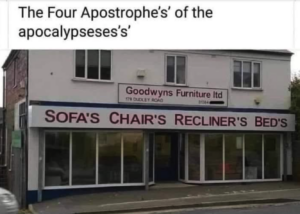
If you are a reader, no matter HOW you read a book, try to leave a review of some sort. It doesn’t matter if you checked it out from a library, borrowed from a friend, or “stole” it from the Urgent Care waiting room while they held you hostage.
Go to Amazon, ideally. Whether anyone likes it or not that is where most REGULAR PEOPLE look for books/book reviews and try to leave a review.
Yes, feel free to leave a book review at Goodreads. But I will say that, as I have mentioned far too many times before, regular people (*code for readers) have no idea what Goodreads even is. AVID readers do. Readers who are also writers or who aspire to be authors do.
Normal folk? Not so much.

***And a lot of authors steer clear of Goodreads. WHY? Unless things have drastically changed—which maybe they have—Goodreads once allowed trolls far too much freedom to abuse writers.
REMEMBER, 94% of the literate population—if they had to list their top ten or even twenty favorite things to do in their free time—would NOT list reading anywhere in there. In modern society, books are competing against Instagram, TikTok, podcasts, games, Pinterest, yoga, vlogs, YouTube, kitten pictures, and LIFE.
I “get” Amazon might be a pain because you didn’t buy the book there. This was a move to reduce “sock puppets” (fake accounts leaving fake reviews—good and bad).
Yet, since this section is geared toward talking you, the reader, odds are pretty good you accessed/bought the book on Kindle, Audible or Amazon.
WHY the Book Review Matters
The reason a book review is more critical than ever in publishing history is because writers—real writers—are facing extinction. I don’t mean to overdramatize this, but I’ve always been truthful here.
The digital marketplace adds well over a million titles a year, and this number is only increasing…logarithmically.
Whether these are new titles or finally someone digitized that favorite pulp fantasy series from the 1960s, it is a LOT of books.
This compounds on top of titles that are already digitally shelved (essentially) indefinitely.
Unlike the bookstores of old, titles are not swapped out for the “new releases.”
In the 1980s, Michael Crichton was only competing against similar works released in a certain time frame.
He was NOT competing against every book ever written, on top of a gazillion new authors writing scientific thrillers.
Additionally, rogue entities are always searching for new and improved ways to plagiarize and steal. Several years ago, Amazon caught foreign actors taking old romance novels from the 70s and 80s, changing the titles and covers, and changing just enough of the text to pass programs designed to spot plagiarism.
Now, we have AI.
*curls in corner crying*
Maybe this helps you understand the terrific odds the everyday author—whose name does NOT rhyme with “Stephen King”—is up against.
What that Book Review DOES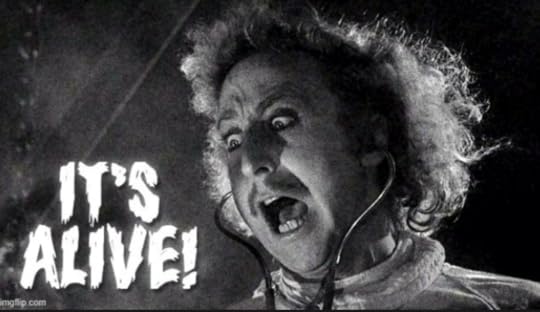
When anyone leaves a review, it demonstrates that title has a pulse. The more reviews, the stronger the pulse. Amazon’s algorithms (or any on-line site’s algorithms) NOTICE that pulse and will then FAVOR that author’s book.
Once our book is favored, this is when potential readers, when looking for their next read, will see, “Those who liked X also liked Y.” This does more than any amount of advertising, which doesn’t work for books anyway (not like other kinds of products).
Why are there ads for toilet paper? Who’s NOT BUYING this?
Here is WHY Traditional Marketing Does Not Sell Books.
Traditional marketing might not sell books to the everyday person (that post explains why), but it CAN sell to the avid reader.
Places like BookBub are a real boon for an author to score, but therein lies the problem. Though not a specific requirement, BookBub is unlikely to select a book with NO REVIEWS and no demonstrable platform to promote.
Thus, it can become like, “We can’t give you a credit card because you have no credit, but you have no credit because no one will give you a credit card.”
When we leave reviews for authors, this eventually allows them access to better tools to sell their books.
The review—and I am saying this carefully—is also priceless feedback. Ideally, a review lets us authors know what we did well, and maybe areas we can improve.
***Though put a pin in this, because we’ll address this in greater detail in a moment.
HOW to Review
Too many people, including authors, get their heads wrapped around the axle on this. We are masters of over complication.
Breathe.
First of all, reviews do not need to be overly long.
No one is asking for an essay and a point by point dissertation on the story. A sentence or two is FINE.
Secondly, remember there is a living, breathing human being on the other side of that review. Their ONLY “crime” was attempting to entertain us. If they failed? They put in hundreds of hours of work at least trying. Please remember that.
I’ve been a major resource for authors since roughly 2008. No lie here, I’ve had to talk writers out of suicide because of trolls. Several left writing altogether because of vicious reviews (and gaggles of trolls that Goodreads, at the time, refused to rein in).
Brave New Bullying: Goodreads Gangs, Amazon Attacks���What Are Writers to Do?
Which might seem like a writer is being sensitive, but even I have felt compelled to step in on reviews and tell a “reviewer” to knock it the hell off.
It is totally okay to not like a book. It is, however, NOT okay, to be needlessly cruel. While I WILL counsel fellow authors to suck it up and get a thicker skin, I also know it’s impossible to turn off being human.
The sensitive soul who chooses a profession that everyone enjoys and very few appreciate is a person to be cherished.
So they screwed up. Fine.
What did they “screw up”?
It is perfectly all right to say:
“I couldn’t get into the story.”
“The pacing was too slow.”
“The characters confused me.”
“The story was good but the poor editing a major distraction.”
“I struggled to root for any particular character.”
“The pacing was too fast and I didn’t have time to care.”
“Too many subplots. Felt I was in the weeds.”
“Took too long to get to the point.”
“Lack of setting confused me.”
“Fight scenes went far too long. Wore me out.”
“The world-building confused me.”
“Author didn’t follow her own rules for magic.”
“I’m sure it was a good story, but needs a different narrator (for audio).”
These are practical points of why any person might struggle with a story. Comments like these help the writer improve.
What KIND of Book IS IT?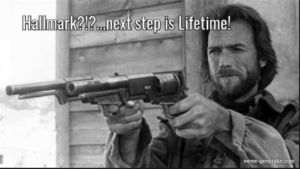
Also, remember to rate a book accordingly. For instance, when I wrote The Devil’s Dance, I did not set out to win a Pulitzer. Readers who LOVED Viet Thanh Nguyen’s The Sympathizer, were NOT and ARE NOT my audience.
I was looking for the reader who liked the humor of a Janet Evanovich mixed with the grittiness of a Dennis LeHane (because humor offset me exposing the reality of life in Texas and the brutality of the cartels). My GOAL was to write a book people inhaled on a flight or a weekend by the pool.
Thus, when reviewing the book, what KIND of book is it?
Then rate accordingly.
If I read a novel that is pretty much designed to be brain candy? I judge it as brain candy.
“How well did the author succeed at helping me forget the world is going to hell in a hand basket?”
Maybe they had anachronisms. That punch bowl didn’t come out until 1863, and wasn’t around in 1859, you MORON. Any idiot with GOOGLE would know THAT.
OKAY. That’s really the hill to DIE kill an author on?
Send the author a polite note in an email if you must. A lot of us appreciate when someone kindly points out we have our digital fly down. We live in a time where we can usually FIX those issues.
Why I Rarely Write Detailed Book Reviews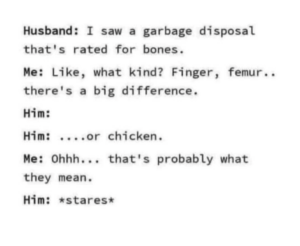
Before you think I am a hypocrite, let me explain. I always leave some kind of book review if I managed to FINISH. Even if it is just stars and a sentence or two. I generally prefer to write reviews for NF (non-fiction) since it is far less subjective.
As an editor for over 20 years, I think it’s unfair for me to do a thorough book review because I see things mere readers do not. It would be unkind to ruin the “magic” for those looking to reviews to BUY.
I am David Copperfield watching Chris Angel. As a fellow illusionist, I know the tricks of the trade, the trap doors, smoke machines, and misdirection. It’s therefore, uncool for me to spoil it for readers and to hold the author to an impossible standard.
Me pointing out all the word echoes, the lack of continuity, every plot hole, etc. would be ME showing off, and of no help to the author or potential readers.
Yes, I have read books I wanted to throw across the room. But, if most people liked it? I—as a professional showing professional courtesy—leave it be. Just say nothing and leave it alone.
Clearly, others enjoyed it.
I get that some authors out there might be railing at the heavens that readers won’t know if a book is good or bad. Yes, that is a risk. But I also appreciate the ridiculous odds most of us face even getting a book finished and in print.
Cutting the legs off of colleagues is not my thing.
Readers who are NOT writers? Feel free to leave a couple stars then something actionable about why the story vexed you. Or, conversely, why you LIKED IT! Even if it’s just a simple, “Great story. Had a good time. Helped me chill out for an afternoon.”
Boom! Done!
A Note to Authors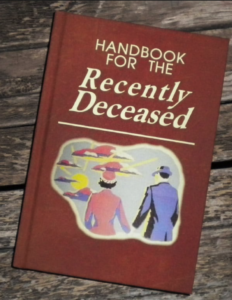
I genuinely hope you can share this post with family, friends and those you “know” on social media. Too many people just genuinely do NOT understand WHY reviews—yes, even “bad” ones *weeps*—are important.
Avid readers can be the worst. We inhale books faster than metal bands rip through lines of cocaine.
We’re the anomaly.
We don’t understand why one wouldn’t sell plasma to buy the rest of that fantasy sci-fi series before the next payday. Yet, as much as we LOVE books, we can be the world’s worst at leaving a review.
Stop that.
If we want reviews, we need to give them (as in a “book karma” way). Figure out how, when possible, to be honest, helpful and kind.
We must also respect that there is no automatic quid pro quo. I gave your book five stars, so can you do that for mine? Uncool. I’ve lost people I believed were friends over this.
Sometimes, it’s simply I don’t read that genre.
I “get” that not everyone likes Tales from the Crypt Twilight Zone-style horror/ghost stories. Though I recently posted my new anthology, What the Hell Did I Just Read? I completely appreciate not everyone LIKES that genre.
I’m not going to emotionally blackmail friends, followers and family into saying they like something they don’t.
WORD OF CAUTION on Book Reviews
Getting family or fellow authors to review can be highly RISKY because of abuse in the past. Amazon specifically, frowns on this and can overreact. We chance hitting a hornet’s nest so weight that carefully. Sometimes, Amazon doesn’t blink. Other times? They’re on a book review like SkyNet on a body heat signature.
Most of y’all here? We should be enough degrees of separation to be fine. So yes, your platform is valuable.
The main reason I am saying anything is because if we are reading, it doesn’t automatically mean we are buddies. I read plenty of indie authors I have yet to meet.
I’m rereading The Perfect Storm by Sebastian Junger. I read it when it exploded back in the 90s. It is an absolutely breathtaking book, but I did NOT like the movie (but that was because I should have seen the movie FIRST and then read the book).
Not the author’s fault.
It would be AMAZING if Sebastian and I were BFFs, but we sadly are not….
yet.
Yo, Sebastian! A restraining order is a bit much, right? Love the new blinds, though.
Additionally—and I am saying this with LOVE—some writers publish too soon. I like the new publishing paradigm for a number of reasons.
***Like being able to publish short stories (refer to above).
All this said, expecting a quid pro quo is patently unfair. There are a lot of writers who rush to publish before they’re ready.
I know it is trendy to say NYC and gatekeepers suck *hair flip*, but sometimes they actually save writers from themselves. Every day, I THANK GOD agents turned down my 187,000 word mystery-thriller-suspense-romance-comedy-action-horror-self-help when I was too stupid new to know I was stupid new.
Yes, I am being hyperbolic…but not really.
Book Reviews: Every Little Bit Matters
Whether you are an author who wants a career or you’re a reader who wants more good books, every little bit makes a difference. If we fail to take time to review books we enjoyed (even if it was we enjoyed them enough to finish), then we leave that book to die a lonely death.
What eventually will happen is the writer will become discouraged and give up writing. Then, when all we have are a bunch of poorly written AI-enhanced garbage books, we will have only ourselves to blame.
WE have to inform the market. If we fail to inform the market, then the market can only guess what we “want.” This is where we can tip into things I don’t really want to discuss at this time (like buying reviews).
Do we really want a world where the alleged “cream of the crop” bought their way there? Or do we want them to authentically earn their spot?
The WSJ just suspended their best-seller list and USA Today has also struggled for the past couple of years to keep their list alive. In my opinion—and that is all this is—it is largely due to a dearth of authentic reviews while also struggling to police honesty in the system.
I am not shouting down any authors. I’ve worked in CyberSecurity and there’s so much nonsense coming out of countries most people couldn’t find on a MAP. New world with new challenges.
BUT, together, we can help each other out.
What Are Your Thoughts on Book Reviews?Are you an enthusiastic reviewer? Any tips to keep from getting in the weeds? OR have you been remiss on leaving a book review? Were you “Today-Years-Old” when you realized just how much your book review matters?
It’s all good.
Look at your Kindle, your Audible list, or that stack on your shelf and take a couple titles at a time and give them a shout-out! Even if it is three stars and you tell them you “loved the world-building but the pace was too slow.” You aren’t being mean and that will actually help the bots sense LIFE. Enough reviews and a book could take off.
That is at least ONE awesome thing about the digital age of publishing. A book listed eight years ago very well could take off as a best-seller with the right push.
Are there some tips, tricks, advice you’d like to add? Because “normal people” code for NOT WRITERS do not understand all this. WE need to explain the best ways they can support us.
The post Book Reviews: Why They Matter SO Much appeared first on Kristen Lamb.
October 31, 2023
Redemption: Can All Characters Be “Saved”?

Redemption is a much more prolific theme than most might realize.
Whether it is a fun, romantic Helen Fielding (Bridget Jones Diary), a gritty Cormac McCarthy (The Road) or a therapy-inducing Ken Follett (Pillars of the Earth), they hold one common thread.
Redemption.
Will Bridget finally see the truth of herself—that she’s shallow—before she commits to loving the wrong man?
In a world gone mad, can the actions of a Man and a Boy redeem faith in humanity?
In a world of unspeakable violence and savagery, will justice ever be served? Is Tom Builder—a man who abandons his newborn by his wife’s grave—worthy of redemption?
Whether the story is a short cozy romance or an epically long historical, we still see this embedded desire that even bad people deserve another chance. I believe this is a good thing, and demonstrates that hope springs eternal with us humans.
Thus, today, we’ll explore the notion if all characters can be saved? Should they be? And how far can we push the line before readers no longer care? What does the undertone of redemption add to story and what do we risk losing without it?
***Feel free to skim for what applies to you. My blogs are long, but I guarantee you they are a LOT shorter than the thousands of pages of reading I use to boil down for this “bone broth.” Moving on….
Flawed Characters ALL Require Redemption
This weekend, Spawn and I (horror junkies that we are) watched Emesis Blue on YouTube. Overall, enjoyable. Some INCREDIBLE imagery. Very well executed. But, since once an editor always an editor, it is almost impossible for me not to find SOMETHING that could have been done a bit better.
So far I have only discovered about 5 perfect books in the thousands I have read that I wouldn’t change a word (FYI: None are mine). Same with movies.
The ONLY thing I could pick on was the film didn’t make it really clear WHO I needed to “root” for. Horror can, like literary, be a genre that is ALL BAD PEOPLE. You literally find yourself simply siding with the least bad, bad guy…which is fine.
But do you want your story to be “okay” or “fine” or “Good enough”? Or do you want it to go to that next level?
This is where character arc can be a game-changer. When I mention “redemption” it implies the character needs to learn, change, grow or evolve in some way.
When characters are “too perfect” or the converse “too horrible/stupid to live” the story can stall. This isn’t the 1950s. Shock value and BIG THINGS HAPPENING are okay, but they’re sorely lacking when it comes to hooking an audience for the long-haul.
We can have the most amazing writing, prose, setting, and even clever plot, but if readers don’t CARE about the characters, they grow easily bored. Bad things need to happen but….
BAD THINGS Alone are NOT Conflict
Conflict is simple. Two people with different levels of POWER wanting their own thing…collide.
That is it. Simple, but not easy.
In police procedurals, the BBT (Big Boss Troublemaker) is the CORE ANTAGONIST responsible for creating the story problem in need of solving by THE END. Often it is a killer, criminal, thug, or someone breaking the law in some way.
BUT….
Where the MC will often experience the MOST pushback will be from those closest. Every scene needs an antagonist. We need to make the audience worry. If everything is too happy-dappy and everything is sunshine and rainbows, that is not a novel. It is an overly long Hallmark card.
Back to the police procedural and uneven power.
Detective Hardnose WANTS to hunt down KILLER.
Police Chief Blowhard WANTS to win an election.
Detective Hardnose’s methods are unorthodox because that is only way to catch the killer BUT Chief Blowhard is getting bad press. HE wants the killer caught…but with kid gloves that don’t upset voters.
See the power imbalance? Detective Hardnose STILL needs to stop a killer. He STILL knows conventional policing won’t work, BUT he needs to use his skills and brain to figure out a workaround.
Whether it is conflict with a superior officer, Internal Affairs, the Feds, meddling politicians, or even the detective’s own FAMILY…note the power struggle. THIS is what turns pages.
CAN the detective catch the killer, please his boss, keep his badge and maintain his marriage and relationship with his kids?
We WORRY and WORRY IS FICTION GOLD. Regardless the genre, your reader needs to worry every single page all the way until THE END.
An EVEN BIGGER KAIJU!
There is a great little flick called Pacific Rim. And forgive me because it will seem like I am contradicting myself, but bear with me. Pacific Rim is a fantastic flick for young boys. I grew up on anime (Voltron, Transformers, Robotech, etc.) so it was a fabulous throwback to that.
This said….
The entire plot is basically some inter-dimensional rift has opened up along the—you guessed it—the Pacific Rim, where giant monsters wriggle through to unleash mass destruction on large cities (popular back when we still found CGI fascinating).
Mankind creates basically giant robot suits to battle Godzilla-esque creatures.
The ENTIRE plot is really just…a BIGGER KAIJU! Then a BIGGER KAIJU! And, in a totally unexpected plot twist…the BIGGEST KAIJU EVER! (Until the next movie).
That is it.
And if you’re writing campy stories/movies that appeal to predominantly young boys, teen boys and/or middle aged women with the sense of humor and tastes of a 9th grade boy…FABULOUS.
LOVE SHARKNADO! Almost as much at Lavalantula.
But these are B-movies people enjoy for the precise reason they are so wonderfully BAD. I bet you most folks couldn’t NAME a single character from any of these kinds of movies. We also really never worry in any of these “stories.”
When it comes to BOOKS? Here’s the problem.
Most People Don’t Like to Read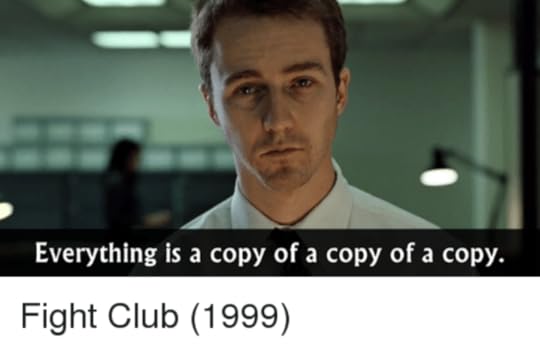
It is an old post but a lot of my content is evergreen. Check out Why Traditional Marketing Doesn’t Sell Books for a more in depth breakdown. Everything in that post from 2011 is true today. Actually much MORE SO since we have so many other mediums of entertainment all clamoring for our attention.
But, when surveyed, something like 94% of people admit that reading is something they want to do more of in theory, but never DO. If asked to list the top 10 or even 20 things they believe they’d like to do with their spare time…reading doesn’t make the list for MOST literate people.
That’s the “bad news.” The “great news” is people LOVE to read…they just don’t know it yet.
If you don’t believe me, how many people have you told you were a writer and the FIRST WORDS out of their mouth were, “Have you read 50 Shades of Grey?”
They might not read ANY OTHER BOOK, but “regular people” (code for “future readers”) are absolutely CULT-LIKE when they find a book (or series) they fall in love with. They’ll genuinely believe they still hate to read…but they love everything Harry Potter, Hunger Games, 50 Shades, etc.
They’ll practically have a SHRINE with all the hardbacks, the merch, the movies, etc.
What this means is we writers have to do better. We can’t hook like 1950s pulp novels that sold like hotcakes because what else would someone do on a long bus ride, in a waiting room, during bad weather, etc. What this ALSO means is that stuff that hooked 20 years ago, just will not work today. Apps and games and YouTube are low-hanging and shiner/easier fruit.
Readers are Narcissists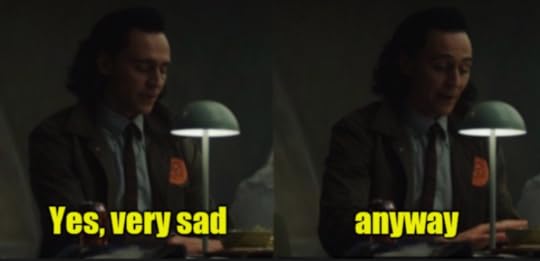
HUMANS are narcissists. Use that. Why do we (the nerdy readers who cannot FATHOM NOT loving books) get hooked on certain books or series? Usually, it is because we see something of ourselves. We cling onto particular characters because they reflect us in some way for good or bad. What we are, what we wish we weren’t, what we aspire to be.
This is why that redemption aspect is SUCH a game changer.
We cannot relate to super perfect people. In fact, there is a human psychological phenomenon referred to as Schadenfreude that explains exactly why we’re more prone to root against perfect people.
I get it sounds horrible, but back in the day of tabloids, what sold more copies?Angelina Jolie with cellulite? Or Angelina Jolie looking freakishly and inhumanely gorgeous?
Cellulite obviously (though unsure that pic even exists, just using as an example).
It was nice to “knock her down a peg,” WHY? Because it humanized her. It wasn’t per se we wished anything horrible on her, only we couldn’t see her as one of “us” so long as she had unfathomable natural beauty, the perfect body, a gazillion dollars, and was even NICE! She rescued/adopted children from all over the world, etc. etc.
***Feel free to insert whatever superstar/rockstar, etc. instead.
We were fascinated not by “bad things happening to her” as much as realizing she was a person just like us.
So, if we KNOW humans are wired this way….
USE IT!
Make Characters NEED Redemption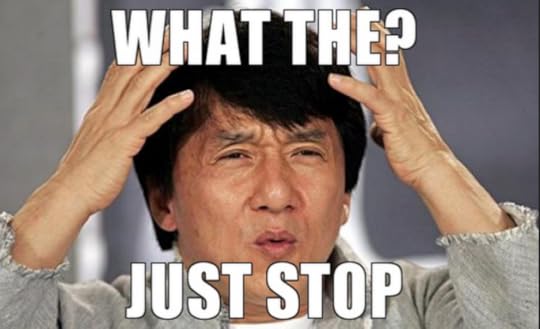
Even if we go to the Hallmark movies, please appreciate that millions and millions of people love watching every year, especially at Christmas. We can easily see the human need for redemption. Hallmark (as formulaic as it is) still offers super perfect but FLAWED characters.
Obviously the plots are usually over the top because, while Hallmark might be formulaic, the formula WORKS.
Same with cocaine, FYI.
Even if the main love interest is the heir apparent to some tiny country no one’s heard of, something in him is missing/damaged/broken that only the love interest can fix. Is he too serious? Has he become unbalanced? All work and duty and no fun? Does he take his role for granted?
Same with the gal. Maybe she is a spunky assistant who’s pretty and clever and kind…but she is usually a hopeless klutz, is super insecure, is socially oblivious, is overshadowed by a sibling. Whatever. OR, she could be the one who is the “ice queen” who is all work and no fun.
Doesn’t matter.
It does mean your characters need to be their own worst enemies and the PLOT is all that can save them from themselves.
Redemption to Scale
The great part about thinking in terms of redemption (instead of “character arc”) is that it makes it a) practical and b) scalable.
Obviously if I am writing a cozy mystery, then an MC with a habit of cocaine and hookers is a poor choice. Instead? A hopeless busybody who’s meddling comes back to bite.
If, however, I am writing a gritty action thriller, then a well-meaning busybody is a poor choice. And cocaine and hookers for the win!
For those who want to do or even TRY NaNoWriMo (which I always recommend), this “redemption” idea will be important to keep you going for the long-haul.
I recommend starting with a NEW idea (especially if you struggle with finishing). Seems like bad advice, but bear with me. I’m going to offer you a new process to try.
Get your “idea” then whittle it into ONE SENTENCE.
What is your story ABOUT? I have a walk through here HOW to do this.
Pitch Your Story in ONE Sentence
Once you have that sentence, think about what would make your character emotionally intriguing? Sure, they’re a 100th degree blackbelt, know 15 languages, do parkour like Jackie Chan and all that is great…
But the more superlatives we add, oddly enough the less interesting the character becomes.
All those “bad@$$” qualities aren’t what make the character interesting. What makes them interesting is they have 100 superlative qualities but THIS FLAW lays them low.
Will They EVER Succeed?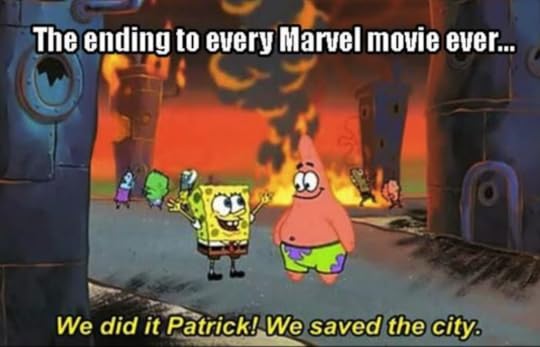
Okay, so flaws. This is where we have to do some of the more delicate work in our craft. AGAIN, genre will inform this. Hallmark-style romance is NOT about hard-boiled terrible people doing terrible things to even more terrible people. Converse is true as well.
Y’all got that because you’re super smart.
With the lighter reads, we have to be careful we don’t make everyone too perfect. When it comes to other genres, this starts to scale.
On one end of the spectrum is Lee Child’s Jack Reacher. Former M.P. who lives off the grid for whatever reason and always seems to find trouble. His flaws? People skills are often terrible, he pisses off authority figures, and his personal life is…yeah.
The other side of the spectrum are your anti-heroes. They’re SO BAD but you cannot help rooting for them. Think Lestat in Interview with a Vampire.
So get your idea into ONE sentence then CAST appropriately. What does THIS story problem (plot) have that will serve as the crucible to refine that flaw?
The HBO Series True Blood did this phenomenally! Eric Northman is the oldest of the vampires and he’s lived SO LONG life has no meaning…until he falls for Sookie. BUT, his Viking/Vampire ways, while his greatest asset, also create the most problems.
With Redemption, Balance is KEY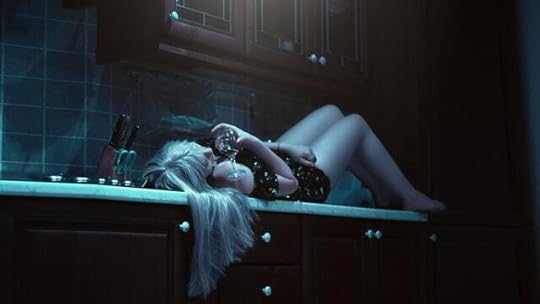
This is where a LOT of intentional reading is your friend. You do not have to reinvent the wheel. The wheel works. And odds are, if you read enough, you’ll have enough pieces to create something wholly unique. The same but also totally NEW! Reading will also train you in certain techniques.
Back to balance.
We cannot write a book everyone loves. EVERYONE is not my audience or yours. I absolutely loved The Girl on the Train. The MC is a really, really bad alcoholic, thus an unreliable narrator. I had no problem with her, but she wasn’t for everyone.
Conversely, I read a “suspense/thriller” that was traditionally published and had a gazillion 5 star reviews…and the character was too dumb to live. I finished it because I am stubborn and I think we can often learn more from bad books than good.
It was as if the author had never read the genre and all I wanted to do was scream and throw the book…which I would have done except I read on my phone and that’s too expensive to break.
Proving my point that everyone is different.
How to Redeem the Seemingly Irredeemable
So for those who read the lighter genres, make sure to give them some relatable flaws. For everyone else….
Anti-heroes are difficult. There is a fine line we have to tread. We will not be able to make everyone happy. My new anthology WTH Did I Just Read? has a sampling of my writing. I LOVE anti-heroes and unreliable narrators. Will some love EVERY character in every story?
Duh, obviously *hair flip*
Kidding. Even I know that I might totally turn readers off on ALL of them or some of them or one of them.
If, however, you want a gritty character, tips for “redemption”….Make them the lesser of evils.Dr. Hannibal Lecter might be terrifying, but not nearly as terrifying (or reprehensible) as the men he takes down (Eg. Mason Verger).
2. Give them a glimmer of a characteristic that is deeply likable.
Jessica Knoll’s The Luckiest Girl Alive features Ani, who is a scheming, shallow, conniving “Mean Girl.” At first glance, she is a horrible human being. She’s vain, gold-digging, and will do almost anything to get ahead professionally. Yet, in one of the opening scenes, Ani is interviewing for the very coveted position as her intern at a super prestigious fashion magazine.
How does she choose? She takes the applicants for coffee downstairs at the little newsstand where a disfigured immigrant named Loretta works. When the stand first hired Loretta, people complained because she was unsightly (burn scars), spoke broken English, and had a bit of body odor.
ANI, however, noticed all the coffee was fresh, including the creamers (even the soy milk). The store was always spotless and the magazines were artfully displayed.
Ani not only notices what others do not, she JUDGES others on how they TREAT Loretta. The minute they whisper anything cruel or degrading, Ani blackballs them.
She is deliciously awful.
3. Make them sympathetic.
Yes, in The Girl on a Train, Rachel is a spiraling alcoholic…BUT when you learn what she survived and WHY she is using booze to cope, it “can” soften you enough to give her the benefit of the doubt hoping she’ll get her act together with the addiction.
Structure can also be your friend.
IF you struggle to make them sympathetic, then have another character who sees the good in them. This worked with Sookie and Eric.
I just finished listening to an audiobook that is among those elusive “perfect books” I mentioned earlier. Old Country is a ghost story/psychological suspense/horror that left ME shaking. I vacillated between I dreaded to read more, but also could not read FAST ENOUGH.
One of the reasons I LOVE the horror genre is it is the toughest genre to write well. For the story to work, you really kind of need characters to do dumb, counterintuitive or even self-destructive things.
How did Old Country pull this off without characters falling into unlikable/too stupid to live? There are two MC POVs, one the husband and the other the wife (a.k.a. the “Buddy Love” structure).
The husband is belligerent, stubborn to the point of ridiculousness, self-destructive, impulsive, etc, etc. which the story demands for plausibility and also for one HELL of a knockout ending.
We “get” he’s a combat veteran in the opening scene, so we already forgive A LOT.
But not everything…THIS is where the author did a brilliant job by adding in the WIFE’S POV. Wives have a way of seeing in ways we cannot, in ways their husbands cannot. True in life and in fiction.
The wife serves as a foil. She’s a sort of an advocate there to tell us (the reader) as well as other characters that “this reaction was over the top, even for him.” Or that “something had to be terribly wrong because, while he definitely had an anger problem, he’d NEVER ONCE raised his voice like that, so he HAD to be TERRIFIED.”
The only thing I would caution here is that this partner character needs to serve the story more than just being there to “explain away” bad behavior.
But the cool thing is…they can explain away bad behavior. They can smooth the rough edges that might, otherwise turn a reader totally off our story.
Think Frodo and Samwise or Dr. Watson and Sherlock.
The “Buddy Love” structure is fantastic if you need to balance out a particularly irascible character. They can also help the other character arc because that character is just too blind/damaged to do it on their own.
Redemption is wonderful in life and it is fiction GOLD.
***Why else would we have rooted for SPIKE all those years in Buffy?
Redemption makes characters fascinating. They’re such a danger to themselves and others we wonder if they’ll ever get their act together. We want them to because if THEY can do it, so can we.
I LOVE Hearing from You!What are your thoughts on redemption? Do you see how common this theme really is? Does it add that little extra je ne sais quoi to a story for you, too? Who are some characters you never thought could be redeemed? Are there others you wish HAD been redeemed?
To prove it and show my love, for the month of OCTOBER, everyone who leaves a comment, I will put your name in a hat.
***I actually have landed agents for people who���ve won this contest. Agents like me because I make their lives easier.
If you comment and link back to my blog on your blog, you get your name in the hat twice.
What do you win?
The unvarnished truth from yours truly (and maybe even time with an agent).
I will pick a winner once a month and it will be a critique of the first 20 pages of your novel, or your query letter, or your synopsis (5 pages or less). People with superlative writing, I (with your permission) have been known to pass you onto an agent.
Anyway, I look forward to reading your comments and your writing!
The post Redemption: Can All Characters Be “Saved”? appeared first on Kristen Lamb.
October 23, 2023
Crossroads: Do the Dead Tell Tales?

Crossroads refers, literally and poetically, to the place where at least two roads (paths, destinies, or decisions) meet. For over 15 years, all of my blogs have been on writing, the craft, publishing, and the writing business. I’ve also posted a lot on basically how to handle this thing called LIFE when one is called to talk to their imaginary friends for a living.
I’ve never posted any of my fiction as a blog post. But, in the spirit (no pun intended) of Halloween and to celebrate my book release—TOMORROW—we, too, shall pause at a spot where more than one path converges.
Instead of Kristen Lamb the teacher, today, is Kristen Lamb the storyteller.
And I promise to stop referring to myself in the third person…for now.
This is the opening section of the story that kicks off a horror/noir anthology I’ve created with the wonderful and talented Troy Lambert. The similar last names are merely happy coincidence, as well as our similar writing styles.
Before anyone freaks out over the idea of “horror,” our anthology–What the Hell Did I Just Read? Volume One—is written in the tradition of Alfred Hitchcock, Black Mirror, and The Twilight Zone, not slasher horror.
No chainsaws…so far.
Thank you for taking a moment to read MY fiction for a change, though I always enjoy reading works from YOU guys (finishing edits actually).
The ebook is only $4 so help a fellow writer out. Even if you don’t like scary stuff, feel free to buy for the weirdo(s) in your life who does.
Without further ado….
Crossroads
The boy was the product of a traveling bible salesman who���d fallen in love with a prostitute. Story was his mama���d run away from New Orleans still covered in bruises from her last beating, a beating so bad she���d swallowed two previously loosened molars.
Hitchhiked as close as she could get to Houma before the pig farmer who���d offered her a ride panicked when she���d started talkin��� to people that wadn���t there.
Didn���t wanna get mixed up in whatever trouble the crazy woman was in, injured or not. Forced her out onto the weed-choked shoulder of a country highway before speeding off, her cheap high heels forgotten in the floorboard of his truck.
That particular July day was hotter than any she could recall. The road shimmered with heat that reflected down from a cataract white bowl of sky. Heat piled on heat piled on more heat.
She didn���t dare walk in the tree line for fear of missing her chance to hitch another ride.
Plenty of cars passed, but no one stopped.
So, she���d walked. Walked until she���d heard voices again, only those voices was different from the ones she normally heard. Nice voices. Sweet and kind. Voices she thought was angels calling specifically for her.
Who���s that young girl dressed in red?
She stopped short and gaped down at her threadbare party dress that reeked of old cigarettes and sadness. Absently, she fingered one of the few glorious glass beads that still clung to the ragged bodice. The baubles snatched up sunbeams then shattered them into crimson sparks. Her dress had once been so beautiful. So had she.
Must be the children that Moses led.
More singing. She shook her head hard, but the voices remained. Either she���d gone fully crazy or was dyin���. Perhaps both, only now she didn���t care.
Wade in the water. God���s gonna trouble the water.
The music intensified, a riot of notes lifting over the treetops like birds taking flight. The song drew her into the cool shadows, into the piney woods which she figured was a better place to die anyway.
Better to die on a soft bed of pine needles than on the gravel shoulder of a highway to nowhere. She walked as far as her legs would carry her; walked until she collapsed in the doorway of a roadside tent meeting.
She went looking for Jesus and instead found a husband, the handsome salesman who rushed her to the closest hospital.
***
Annalise Curbow was her name. Curbow, originally Corbeau, was derived from the Old French word corb, which meant crow. The boy always found it interesting that a group of crows was called a ���murder.���
They were also known for mating for life, but his mama hadn���t been that kind of bird and migrated far from their home near Shreveport two years after he was born. Left him in a Piggly Wiggly. Told the clerk she���d forgotten her purse in the car, asked if the clerk could hold him, then never returned. Left the boy, the old Pontiac and a hastily scribbled note with only two words.
���Forget me.���
This, however, was one thing the boy���s father could not do. His father insisted it had been the voices that had done it. The bad ones had returned and she drew her demons away, keeping the boy safe. She hadn���t left them, she���d saved them.
And for a long time, the boy believed him.
This was all the boy knew of his mama, other than his daddy would never give up trying to find her, propelled by a vision he���d received after a fast so long it nearly took his old man���s life before it gave him a word.
Forty days with only water. Madness. Yet there, at the edge of death, on the shoulder of the glory road, God gave him his answer. His beloved Annalise, wife and mother, would not be found in the world of men, only in the wilderness.
And they���d been wandering there ever since.
His daddy was good at hearing when he was called and following without question. He���d once been a top bible scholar, expert in the Old Testament and ancient languages, a distinguished man who���d walked away from a stack of teaching offers. He���d been called to minister to addicts and ex-cons, then to sell bibles, then to marry a hooker, and finally called to the wilderness to find her.
Leave it all behind in search of a promise. No longer a salesman, he became part father, part missionary, and part something dangerous.
His daddy had taught him how to read using an ancient King James Bible���one with all eighty books���in a one-room trailer on the edge of a swamp. They lived a few miles from a collection of buildings too small to be properly called a town, but still they���d named it anyway. The town was populated with a strange mix of those folks searching and those folks praying never to be found.
They���d fit right in.
He���d never gone to a regular school. By the time the boy was ten, he could read and write Latin, Greek, and Hebrew. No matter how much the boy protested, his old man insisted one could only properly grasp God���s word by going back to the original texts to the original languages used by the authors.
It wasn���t all bad. His daddy also taught him more practical languages. Taught him French and Creole, since they often left the trailer and the not-quite-a-town and drifted off the map completely to dangerous places only good for hiding. Places with their own culture, residents unable to understand English, and probably unaware it was the unofficial national language of the country they lived in. Most of the time, they spoke in the dirty bayou patois like those around them.
The boy and his father would haul dry goods, sweets, and textiles out to isolated pockets of filthy people in homes accessible only by boat. They���d be half-devoured by insects by the time they tied up to docks banked by cypress and guarded by gators. Homes on stilts rose like specters out of the swamps, wood buckled with moisture, the air saturated with briny sulfurous rot that clung to their clothes and invaded their pores.
They���d dine on whatever unlucky critter made it into the pot���possum, nutria, snapping turtle, alligator gar, snake, or all the above. Supper likely consisted of some crawling creeping thing forbidden in Leviticus.
Not quite locusts and wild honey, but close enough. Had the boy known any other life he might���ve preferred to starve, but he hadn���t. He���d scarf down whatever meager meal was offered then go outside to play with children who toted shotguns and wore machetes slung across their backs.
His daddy might have formally been an expert in The Old Testament, but the old man read Revelations so much the sturdy linen pages were clean worn through in spots. His daddy was certain End Times were coming and soon.
Had seen plenty of signs when helping with missions in the big cities, witnessed first-hand humanity���s spiral into the darkest sorts of depravity. Dealt with more than a few dealers, pimps, and conmen. Though his father preferred peace, he was not entirely opposed to violence and had the scars to prove it.
He wanted the boy to be prepared for whatever came, because he knew something was coming. Insisted the boy know how to survive because civilization balanced on a matchstick. The boy eventually dismissed most of what his old man said, thought them the rambling thoughts of a brain par-broiled in the bayou heat.
Alas, when the boy turned twelve everything changed.
***
It happened shortly after his daddy dunked him in the shallows of Caddo Lake. Baptism. He���d broken the dirty water���s surface feeling much the same, save for being covered in mud and insect bites. There was no lighting of a white-winged dove, no sudden parting of the clouds, no grand transformation.
But after that, his daddy looked at him differently, began taking him even deeper into the darkness than he believed possible. Told him it was time to let go of childish things.
When I was a child, I spake as a child, I understood as a child, I thought as a child: but when I became a man, I put away childish things.
His daddy finally was willing to take him beyond the boundaries set by innocence, places where spirits held more sway than Jesus. Dark disregarded realms of superstition and ghosts.
At first, the boy silently mocked these people with homes covered in bones and chalked symbols. He had no idea why his daddy would plunge this far into a place even God seemed to have forgotten. Began to wonder if God existed even though his old man heard God, talked to Him all the time, and saw Him everywhere.
But the boy did not.
All he saw was another day roasting in his boots and getting eaten alive by mosquitos big as birds. Another day in search of a sign that had not come in the twelve years since the promise was made to his father, and he was angry. They���d obeyed God and gone into the wilderness to find his mama.
Instead, they found���her.

TO FIND OUT WHAT HAPPENS (at least as of tomorrow, October 24th)….
Grab a copy, HERE!
According to a study I just made up, “science” demonstrates people who buy and read Kristen’s books are 100% more good-looking and unusually witty and charming.
 “Normal Posts” RESUME WEDNESDAY!
“Normal Posts” RESUME WEDNESDAY!Thank you for indulging me, and I hope, if y’all ARE standing at the crossroads of whether or not you need another book? Yes…yes you doooooo.
Feel free to leave a comment if you like the story (so far). If you don’t like it? Don’t you need to organize something?
Anyway…
With NaNoWriMo looming in the near future, we’ll probably be talking tactics on how to prepare to actually write 50K in a month. For the record, when you write for a living, every month is NaNoWriMo, so it’s awesome practice.
I LOVE COMMENTS!To prove it and show my love, for the month of OCTOBER, everyone who leaves a comment, I will put your name in a hat.
I actually have landed agents for people who���ve won this contest.��Agents like me because I make their lives easier.
If you comment and link back to my blog on your blog, you get your name in the hat twice.
What do you win?
The unvarnished truth from yours truly (and maybe even time with an agent).
I will pick a winner once a month and it will be a critique of the first 20 pages of your novel, or your query letter, or your synopsis (5 pages or less). People with superlative writing, I (with your permission) have been known to pass you onto an agent.
Anyway, I look forward to reading your comments and your writing!
The post Crossroads: Do the Dead Tell Tales? appeared first on Kristen Lamb.
October 13, 2023
Reading with Intent: Becoming a Better Writer

Reading should be the cornerstone activity of all those who proclaim they want to be serious writers. I know this might seem like a “No duh” statement, but sadly we live in a world where even the obvious requires unpacking.
Believe it or not, I love getting comments for more reasons than my own ego (though it is a real boost, not gonna lie).
The main reason I encourage comments is because—believe it or not—I cannot think of everything. I need to know what Y’ALL need to know.
I can’t do that unless you tell me. Mostly because God refuses to let me have mind-reading abilities. Something about blah blah Kristen already drunk with power blah blah humility *rolls eyes*. Then those pesky restraining orders keep me from sneaking in your houses and rifling through your notebooks.
#FunKillers
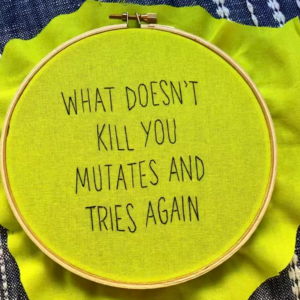
Today’s post comes thanks to a very thoughtful commenter, Harshi S.
I love all your articles and I think reading them made me a better writer and reader/consumer of fiction (and nonfiction) with dialogue. I would like some advice on how to take notes on books I read and media I consume to learn more about writing before I start writing. Also, is it good to read books primarily from the genre(s) one is interested in writing in to learn those specific techniques after learning general writing skills?
Harshi S. (Commenter)
Excellent questions.
Reading Required to Be a Good Writer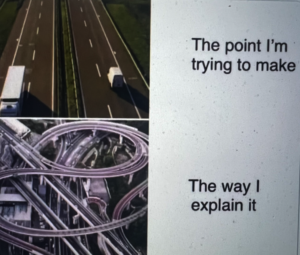
Before we dive into HOW to read, I’m going to unpack what should be the obvious. Feel free to SKIM because (refer to meme above).
Good writers are prolific readers. I can already hear some of you railing at the heavens that I would even devote space to stating this. But, I am pretty sure y’all have not been to nearly as many conferences as I have.
Since 2008, I’ve been very blessed to be a staple speaker and regular keynote at writing conferences all across the United States and abroad. I’ve also attended conferences as a mere writer.
This means I’ve met a lot of new writers who were all (also) hopeful they will be the next (INSERT MEGA SUCCESSFUL AUTHOR HERE).
What never ceases to floor me is how many I’ve met who would openly and often emphatically admit they a) rarely read b) never read c) don’t like reading or d) a, b, and c.
*silent screams*
Would anyone want to go to a brain surgeon who just wanted the fame and lifestyle of a surgeon, but didn’t want to bother taking Gross Anatomy? Who’d never stitched a boo-boo let alone sawed open a skull and removed a tumor?
They just REALLY like brain surgery…”in theory.” Don’t worry! They’ve watched thousands of hours of surgeries, so they just know they’ll be the best (even though they hate needles and the sight of blood renders them unconscious).
Any takers?
Why would we BUY a book to READ from an author, who themselves, declares they don’t like to read?
I hope I’ve made my point.
As an editor of over twenty years, I promise I can tell an avid reader from a non-reader within a few sentences. Yes, it is that obvious. Not fooling me, or an agent, or an actual reader (who you want to spend MONEY on your book).
Reading Makes You Smarter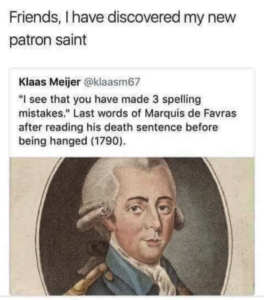
There’s quite a large body of scientific evidence demonstrating that humans are a story people. From an early stage in life, we have an innate sense of plot, that stories have a beginning (Act I), a middle (Act II), and an ending (Act III).
Don’t believe me? Read a bedtime story to a four-year-old and try to stop short. You will not win. Why? Because said little kid will pester to know how the story ENDS. But, just because this is ingrained in us, doesn’t mean we can’t overthink it all away.
***More on this in a bit.
Everything we do in life impacts our neural pathways. If we envision the brain like a tree that is always growing and changing, wilting and dying, it starts to make more sense.
Neurologists have a saying, “Neurons that fire together wire together.”
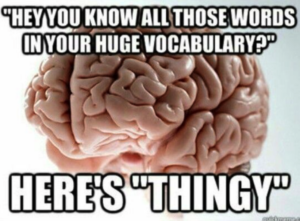
The more we use the neural pathways required for reading/storytelling, the stronger those connections (branches) become.
Glial cells, often referred to as the “gardeners of the brain” wander about fertilizing pathways (branches) we use A LOT. Meanwhile, the same glial cells do NOT fertilize branches we fail to use. In fact, they go so far as to completely prune away and discard those “abandoned” pathways (branches).
Don’t believe me? Without googling:What was the one Roman invention that forever reversed/nullified Carthaginian dominance of the seas?
Convert 190 pounds into kilograms in your head.
Define sobriquet.
We’ll wait…
Or not. Kidding!
Maybe some of you knew these answers but many won’t. Why? We likely knew trivia like this at some point. Thing is, we “learned” it long enough to score well on the test.
Unless, after that point, we stepped into hobbies or professions that would have regularly watered and fertilized these branches of knowledge, the glial cells tossed those factoids into the cerebral mulch pile.
Clearly our Harry Potter Trivia needed fertilizing and the Pythagorean Theorem mixed with a little “What was the theme of Lord of the Flies?” is PERFECT!
Oooh! I’m a Griffendork!
Spirits Wired for Story
I’ve already mentioned how humans have an innate sense of story. This is our READER. They are on the consuming end, not the creating end (which is a WHOLE NEW ball of wax…on fire…that wants to explode and kill you).
We (writers) are the architects, they (readers) are those who use the building. And yes, I am mixing metaphors more than a 90s DJ, so roll with it.
Aestheticism must align with pragmatism. For more on this, I recommend my recent post Pitch Your Story in a Pinch (ONE Sentence).
When we read prolifically, our brains wire for story. We don’t need to think so much about the pieces: Normal World, Inciting Incident, Turning Point Act One, so on and so forth.
Why?
Because it is like learning music by ear. We instinctively sense one part is missing, another part has come too soon, another is taking too long, the work is incomplete, etc.
For the record, READERS (especially voracious readers) sense this. They just don’t always have the vocabulary to say WHAT bothered them. Instead, you’ll hear things like:
The story was too confusing.
I just couldn’t get into it.
It was boring.
The story dragged.
I got confused.
Plotters, Pansters, & Plotsers, Oh MY!
This is why, in my POV, there is really no such thing as a pure pantser. Pantsers don’t outline or plot ahead of time, but that is because they’re the equivalent of a person who’s learned to play an instrument by ear.
They might not need metaphorical “sheet music” (yet the inability to READ sheet music “could” be problematic).
Conversely, those who strictly outline and plot ahead of time are like musicians who embrace formal training and can not only read the sheet music, but write it, improve it, change and modify it.
Neither is better, but I will warn that a little sheet music is good. I am a plotser. Learned by ear, but I’ve learned to make a basic (mutable) plan and scribble the notes as I go.
Pantsers can end up in a sticky wicket during revisions, whereas pure plotters need to be wary of being too rigid. The “boys in the basement” might be trying to send a signal that they’ve come up with something TOTALLY ORIGINAL and better than what you originally planned.
What Reading Does for Writers
Reading will wire your brain for story. Plotting will be easier because you’ll sense when something is wrong. It will hit like a note off-key. Same with grammar. It will sound incorrect.
Writing a novel is HARD. We have to create a structure capable of maintaining interest and momentum over the span of 60K-180K words. To accomplish this, the more tools we have in our toolbox, the easier this will be.
Reading improves your vocabulary, and broadens your literary lexicon. Gemstones aren’t totally BAD, but not entirely unique. Emerald eyes, ruby lips, sapphire skies are literary low-hanging fruit. Are they bad? No. But if any Joe Schmo sitting at the hotel bar can write the same descriptors, and we are supposed to be the wordsmiths?
Just leaving that there.
There are technical aspects of writing that we need to learn to excel at our craft. Things like POV (Point of View). Which one is the best? Why? How does it serve our particular story? What about DEEP POV? Why do readers LOVE it?
What is a scene versus a sequel? This will impact PACING. Can setting be more than a weather report? Yes. The answer is YES.
Why are flashbacks a sign of weak writing, yet many of our favorite stories seem to have “flashbacks”? The reason is these works we love DO NOT have “flashbacks,” rather the author is using time as a literary device (non-linear structure).
We also learn about each genre, how they differ, and what the reader expectations of that genre happen to BE. Genre is going to be CRITICAL when it comes time to either landing an agent or selling/marketing your book. WHO are YOUR readers?
What KIND of Writer Do You Want to BE?
When I finished my first “novel” (the 178,000 word TOME I keep in the garage because it chews on the furniture and refuses to be potty trained), my mom read it. All my friends thought it was the greatest thing ever, but my mom–bluntness also her superpower–simply asked me this:
Kristen, what kind of author do you want to be?
Years later, when I would blog, I’d joke that the rest of her sentence was “…published or unpublished?”
Yet, that simple question changed everything. There are all KINDS of writers. No one genre is better than any other, merely different.
I know the literary people are screaming at the screen, but good luck making a living. If you can live off awards and accolades, be my guest. I WISH I could write cozy romance because Hallmark is always hiring and romance is a multi-BILLION dollar industry.
Reading Helps us EVOLVEWhen we read a lot of different types of fiction and voices, we can better figure out where we fit in the larger scheme of things. And this is NOT set in stone.
I’ve run the gambit from NF, to writing feature articles in a major business magazine, to almost 2,000 blogs, to romantic suspense, a romantic-thriller-suspense, and (if all goes to plan) am releasing a horror anthology with Troy Lambert on October 24th.
***It isn’t blood and gore. Think more Hitchcock meets Black Mirror. It is technically action, horror, noir.

***According to statistics I just totally made up, studies show that people who are unusually intelligent, funny, and good-looking pre-order Kristen’s books.
The point I am making, is that, unlike the old publishing paradigm, we no longer have to be married to one genre until death do us part. Our careers can be far more mutable and more elastic than ever before. Which YAY! But also YIKES!
Reading Develops Voice
I believe every teacher, blogger, publishing pundit at one point in time has probably tried to define “voice.” Even ME. In short, no one is going mistake Faulkner for Hemingway, or vice versa.
How they write, the words the choose or leave out, the way they deliver the story is as unique as their fingerprints.
This said. I was in my church choir enough years that I am a passable singer. No one will mistake me for a cat caught in a screen door. This, however, does NOT mean, I am ready for Carnegie Hall and to sing backup for Adele.
Why? I never worked on it or trained.
Harshi asked if it was best to read entirely in our own genre or to read a lot of different genres.
Yes and yes.If we read a lot to begin with, we’ll have a better understanding of which genre we at least want to begin with. Even if we already know which genre we want to write, we’ll have a deeper reservoir to draw from.
Some of the most groundbreaking musicians were “cross-trained” (Meatloaf was a trained opera singer. Whitney Houston, Justin Timberlake, and John Legend started singing in church). I could go on, but y’all get the gist.
What made many of our most memorable musicians stand apart is how the drew from other kinds of music, weaving elements of Classical, Jazz, Gospel, Soul, Rap, or even…sea shanties.
*Nods to Dropkick Murphys*
Audiences are always looking for the “same but different.” That is going to be easier to do if we’ve curated a rich, broad pallet.
Like how SNL writers married a sappy teen coming-of-age romance with…WAFFLE HOUSE.
WARNING: DO NOT DRINK HOT LIQUIDS WHEN WATCHING!
*giggling*
Go Wide, then Zoom INThere is no right or wrong way to read (so long as you READ), so this is all my opinion. Once we sample from a bunch of other genres and fill our reservoir, then I recommend reading the genre you want to write. I do both all the time, switching back and forth.
I just finished rereading The Exorcist (horror) and Shutter Island (Psychological Suspense) and am currently reading St. Augustine’s City of God (NF).
Reading all that is in the genre you want to write will help you understand genre expectations.
I cannot count the number of times writers have sent me pages and they were SO FAR OFF what genre it was, I immediately knew they’d never read that genre at all. Because, had they read that genre, they would have (or at least should have) known better.
If you hand me pages to your mystery, it better BEGIN with a crime of some sort or it is NOT—by definition—a mystery.
I once had a writer hire me because she was getting slayed in reviews and didn’t know why. When I read her work, it was well-written, but she had it listed as a ROMANCE. In romance, you better have an HEA (Happily Ever After) or the more contemporary HFN (Happily For Now).
If guy and gal DO NOT end up together in the end…that is Women’s Fiction.
She pulled the title, redid the cover and re-listed in the correct genre and everything changed.
Hallmark is Romance. Lifetime is Women’s Fiction.
When you read as much as you can in your genre, not only will you be able to see what readers are wanting, but you might even spot what they never KNEW they wanted until YOUR story.
For instance, I did this with my romantic-suspense The Devil’s Dance. I wanted to write a book someone would inhale in a day or three, not win a Pulitzer. Additionally, I wanted the humor of a Janet Evanovich with the grittiness of a Dennis LeHane.
Since I was writing about the cartels, that is a rough, terrible and yet timely subject. But it is also DAAARRK. Could I balance out the horrible stuff with a funny, relatable, fish-out-of-water character?
Because I’d read ALL the suspense thrillers I believed I could. I spotted what I felt was a gap…then filled it by writing a book I wanted to read (but that didn’t exist/or I couldn’t find).
Reading and Taking Notes
This is going to be completely up to you. My dear friend and partner in mayhem, Cait Reynolds, tells me I am not allowed to use Excel unless I spread a salt circle first. If California breaks off into the ocean one day…um, sorry about that.
My other close friend, Maria Grace and Queen of the Spreadsheet, once saw all the screenshots on my desktop…and I thought she was going to fling holy water at me.
I keep a notepad on my phone because I listen to a lot of audiobooks en lieu of reading. I’m WAY too ADHD to sit still too long.
When I hear something amazing (a factoid, a new word, a turn of phrase) I pause and type it in the app. But, I also write notes on the backs of junk mail, my HAND, random receipts, and notebooks with only the first five pages used.
I buy audiobooks (awesome royalties to the author) and then buy a used paper copy of the same book (no royalties to the author, but I color, underline and dog-ear it to death).
For the record…I still want my stapler.
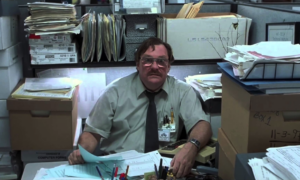
Additionally, I study movies and series in film. I literally sat with paper and pen and watched the entire Stranger Things series beginning to end and wrote out every single plot point on the micro-scale and the macro (series as a WHOLE).
But that is ME. You be YOU. Everyone learns, remembers, and processes information differently. There is no one RIGHT way to take notes when reading, so long as you “take notes” when reading (even if those are mental notes).
Learn by DOING…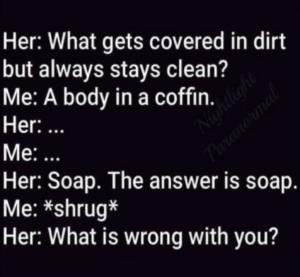
In the end, we learn by DOING. Yes, I want y’all to read before, during and after a book. Read everything you can. What did you LIKE? If you couldn’t put the book down, HOW did the author hook you?
Everything is valuable!
Yes, even “BAD” books. If a book really frustrated you, WHY did it frustrate you?
Did the author fail to research properly? What did they miss? How can you do better? Were the characters irredeemable? If so, why? Were the characters too dumb to live? If you think so, WHY?
Yet, ultimately, we don’t want to be like the imaginary surgeon I opened with. Theory is good, but we have to put it into PRACTICE. Every amazing author was once a beginner, too. The more we write and apply what we learned via reading the better.
While reading is critical, it can also fall into what I call “productive procrastination.” Ultimately I don’t care HOW y’all do it so long as you do it. Respect the profession/craft/art enough to immerse in it.
Thank you, Harshi S. for such a great question (I will email you something special). And THANK YOU readers for being here and sticking it through, even if you are here for the memes.
I care enough to send steal only the very best xoxoxoxoxo.
What do y’all think about “writers” who brag about not reading? I think they believe ChatGPT is going to save them and make them millionaires, but that is a whole other blog.
How do YOU learn from what you read? What are some tips and tricks for learning, making notes, keeping up with notes? Clearly, I AM NOT the person for this advice.
I LOVE hearing from you! Obviously.
To prove it and show my love, for the month of OCTOBER, everyone who leaves a comment, I will put your name in a hat.
***I actually have landed agents for people who���ve won this contest.��Agents like me because I make their lives easier.
If you comment and link back to my blog on your blog, you get your name in the hat twice.
What do you win?
The unvarnished truth from yours truly (and maybe even time with an agent).
I will pick a winner once a month and it will be a critique of the first 20 pages of your novel, or your query letter, or your synopsis (5 pages or less). People with superlative writing, I (with your permission) have been known to pass you onto an agent.
Anyway, I look forward to reading your comments and your writing!
The post Reading with Intent: Becoming a Better Writer appeared first on Kristen Lamb.
October 6, 2023
13 Reasons Writers are Mistaken for Serial Killers

Writers really are a strange breed and just so y���all know? The normal ship sailed without you a long time ago so relax. Your family or friends might not ‘get’ you but your fellow writers do.
I love being a writer. It���s a world like no other and it���s interesting how non-writers are simultaneously fascinated and terrified of us. While on the surface, people seem to think that what we do is easy, deep down?
There is a part that knows they���re wrong. That being a writer, a good writer, is a very dark place most fear to tread.
In fact, I believe somewhere at the FBI’s BAU (Behavioral Analysis Unit for the non-writers), there���s a caveat for the profilers. If they think they’ve profiled a serial killer, they need to stop and double check to make sure they didn���t just find a writer.
Hint: Check for empty coffee cups and candy wrappers.
Since we are now into October, we shall pause a moment talking about fictional anti-villains and talk us REAL ONES *evil laugh*
Writers, if you are NOT on a government watch list? You���re doing it wrong.Seriously. I once spent an entire afternoon googling Fort Worth hotels to find the right one with a balcony to toss someone off of. I was like the Goldilocks of Murder.
Nope doesn���t face a street.
Not high enough to be fatal.
Don���t want them landing in a pool.
Apparently ‘normal’ people do not do this, which is why being normal is totally boring and for luzrs  .
.
So, before friends and family turn you into the FBI, here’s a handy list of ways we writers are often mistaken for serial killers.
#1 Serial Killers Writers Need Alone Time
Generally, dealing with the public is only for a purpose (like making others think we are normal). To truly recharge and immerse in the art of what we do, we need to pull back and simply ‘get away.’
Many writers can be found in basements, dark corners of libraries, hiding in a blanket fort with Netflix streaming in the background or lurking behind a desk surrounded by illegal bear traps.
#2 Serial Killers Writers Often Hold Down a ‘Normal’ Job
Many writers are also teachers, lawyers, doctors, librarians, engineers (or likely married to an engineer���What is WITH that?).
We are often friendly, polite and on-time and hold down gainful employment. This is what makes writers SO terrifying.
Odds are, you probably work with one.
Might even be married to one.
If you don’t work with one, are not married to one, or related to one?
YOU ARE ONE.
#3 Serial Killers Writers Can Look Just like YOU
When our book comes out, neighbors will say, ‘But they seemed so nice and normal. Really polite. Always thought something was off, but writing? Really? Who can ever know these things?’
And probably dated it…
���.until they married an engineer.
When planning any murder or series of murders, we have to know our enemy. The cops. What are ways we can confuse them?
Can we kill in multiple jurisdictions knowing the law agencies will never properly communicate and thus we can kill as many people as our plot requires? Is it possible to run the police down a rabbit hole of distraction?
Could we evade them altogether? Get rid of ALL the evidence?
#5 Serial Killers Writers Use Terms Like T.O.D.
Throw T.O.D. around a writers��� group and no problemo. But using this term at Thanksgiving with the family? Meh.
We writers know the best time of year to kill and dump the body and which season a shallow grave is an acceptable option. No writer ever sees just a freezer. Or just a car trunk.
Trust me, we are thinking how many people we can fit in that sucker and if we���ll have to saw apart the body first.
#6 Serial Killers Writers Hear Voices That Tell Them Who to Kill
And often talk to those voices. We might be driving to Costco when ‘The Voice’ (a.k.a. ‘The Muse’) visits and tells us that we really shouldn���t kill that @$$hat who stood us up for prom.
No, that guy who bailed on his ONE part of the group project, and we got a B instead of an A ? That guy.
Then, so enraptured with talking to The Voice, we find we missed the last fifty exits and have to hope there���s a Costco in the neighboring state.
#7 Serial Killers Writers Choose Victims Carefully These look like winners…
These look like winners…Generally our victims will include anyone who picked on us for playing too much Dungeons & Dragons (no such thing), broke up with us via text message, or told us reading was boring.
Victims can also include former professors who always assigned group projects, anyone who was IN our group for a group project, the person who invented group projects…or anyone who’s in charge at Comcast or AT&T.
#8 Serial Killers Writers Plan Their Kills Methodically
Sure you might get the fantasy or sci-fi author who just wipes out a bunch of villages or blows up a planet, but that’s a different profile. Mass murderer/spree killer is so unimaginative.
For the rest of us? No, we think our kills out. We can���t just kill anyone lest we be left with a pacing and plot problem.
Duh. This isn’t amateur hour.
#9 Serial Killers Writers Have a Timeline for Their Kills
Sure the body count will rise, but during revisions? We just go back and spend quality time with the souvenirs we took off our victims. We might even take breaks between books because we can���t murder characters without a plan.
Helloooo?
#10 Serial Killers Writers are Narcissists
Seriously, we have to be. Who else can write hundreds of thousands of words just knowing the world will love every bit of what we put down? And PAY MONEY to consume it? Narcissists have a God-complex but unlike serial killers who pretend to be God?
We writers actually ARE GOD—muah ha ha ha ha ha *coughs*.
Moving on…
#11 Serial Killers Writers Take People Apart Image via Creepy Freaky House of Horror (Facebook)
Image via Creepy Freaky House of Horror (Facebook)We crawl in your head, but don���t get too freaked out. We crawl in everyone���s head. We think like you. We become you.
Okay so when ACTORS do this it is OKAY and all AVANTE GARDE, but a writer does this and it���s creepy? Hypocritical much?
We need to know how people think, what makes them tick, what sets them off. What are the right pain points and speaking of pain���
#12 Serial Killers Writers Are Also SadistsExcellent fiction is the path of greatest resistance which means good writers are all about exacting pain. Doling it out bit by bit. Upping the heat and making that victim and all who love him squirm, then panic, then question the very meaning of their existence.
We push our victims until just before that spark of hope in their eyes extinguishes completely…..
And then we give them a bone and rescue them so there. We aren���t completely heartless. Sheesh, these people are imaginary.
Why so freaked out? Seriously, chillax.
#13 Serial Killers Writers Struggle with Addiction/Compulsion
Drugs and alcohol? Maybe. Sugar and caffeine? Highly likely. Carbs? DEFINITELY. Books and cute bookmarks we never use because we lost them and so have to use the receipt from purchasing the freaking bookmark as a bookmark? Absolutely.
Female serial killers writers can often be spotted wandering around a craft store talking to the yarn or contemplating learning to make their own jewelry. Males?
Computer stores.
Angels and DevilsYeah, yeah writers could be mistaken for serial killers but in the end, everything we do is for the ultimate good. We actually have to write in mistakes lest our villain remain free and that is bad fiction.
Speaking of which, have you ever created a villain so good you had to go BACK and write in some oopses? Like, ‘Wow, this guy���s good. Nope, they���d never catch him. Ah $#%&.’
Also, our lowly protagonist can never rise to become a hero without overwhelming opposition.
Okay, so some of you by now are either laughing and nodding���or you���re dialing an FBI hotline ready to link them to my blog. Fine, when they haul me away in cuffs, trust me I am making mental notes so when I write a similar scene? I know how cuffs FEEL.
What are your thoughts?Have you ever had strangers overhear you talking about how to kill someone and you had to stop and say, ‘It���s okay. I���m a writer.’
Do you love Discovery ID just a bit more than is probably healthy? Do you yell at ‘Forensic Files’ the way grown men yell at football? Do you freak out friends and family because autopsies make you giddy? Are you more than a little weirded out that we all seemed to marry engineers?
Food for thought…
HERE’S an EARLYThe WRITE STUFF SPECIAL! TWENTY (OR THIRTY) Pages of DEEP EDIT for $55. Anyone who signs up by this Sunday, October 8th, gets an additional TEN PAGES FREE (meaning $1.83 a page). I only have TEN slots, so this offer is only good until October 14th or until the slots fill.
PRODUCT DESCRIPTION:Book sales less than stellar? Keep getting rejected and don’t know why? Struggling with the opening of your novel? Getting 20,000 or 30,000 words in and hitting a wall?
Likely time for some professional guidance.
The ‘Write Stuff’ Special might be the cure for what ails you (or your book).
Agents and editors only give us (writers) a few pages to hook their attention and hopefully a contract. Readers can be even pickier, skimming samples to see if they want to purchase or pass our on novel. Opening pages are crucial for book sales.
Generally, a pro can spot all your weaknesses (and strengths) in twenty pages, but what do we see? Why is the story starting out strong only to fizzle and fall apart? I will tell you for $2.75 a page (or $1.83 a page if you sign up early).
I’ve plotted hundreds of novels, repaired even more, and edited tens of thousands of pages in every genre. Make the most of your time. Stop taking classes on character if that isn’t a weakness. This diagnostic can show you, specifically, where your work needs help (if any).
If you want the truth about your writing, I’m here to help.***This service has only ten slots. It will be open until either ten slots fill or October 14th when the service closes, whichever comes first.
A skilled analysis will give you MAJOR advantage:
A pro has emotional distance and objectivity to spot the real problem areasCritique partners mean well, but may have us ‘fixing’ stuff that isn’t broken while ignoring major red flag issuesWriting partners often lack the skill level or the knowledge for what works and what doesn’t in YOUR genreRejection letters don’t always mean the book is bad. Your time is valuable, so no need to waste it repairing a perfectly good storyWhat this SPECIAL includes:
General line-edit and proofing along with a deep content edit and assessment of the sampleHonest but kind feedback about problems and detailed suggestions/instructions for repairing any issuesTruthful feedback about what you do well! YES! Do more of THAT!***There is a ten business day turnaround beginning day after the submission received. So if you want to take advantage of the extra TEN PAGES, you simply have to reserve your SLOT by Sunday. Send pages when you are ready.
The post 13 Reasons Writers are Mistaken for Serial Killers appeared first on Kristen Lamb.
September 19, 2023
“Woobie” Anti-Villains & Sympathy for the Devil

“Woobie” is a funny word I recently discovered when researching for this post. Funnily enough, the concept of “woobie” is nothing new. As a Gen-Xer, we called these people “emo” back in my day *waves cane.*
This character is also referred to as the “Piti Anti-Villain.” They don’t want to be evil, but life has been so cruel they have no choice. *cues super sad music*
Or do they?
We can see how the “Woobie” anti-villain can easily create some amazing dramatic tension.
Emo protagonists and antagonists have been around for a long time. If I recall correctly, the “tortured character” rose to popularity during the early 19th century.
***Think “Darcy” for protagonist and “Frankenstein” for antagonist.
The emo, wounded souls are bound by their own perpetual torment and just waiting to be saved from themselves. Or are they?
Last time, we discussed what an anti-villain is, and why they can make for some of the most fascinating characters in fiction. First and foremost, anti-villains are fabulous to create…
Stories of Substance
When I wrote The Devil’s Dance (which is a romantic mystery-suspense), I intended for it to be a fun book a potential reader might inhale in 1-3 sittings, such as on a plane flight or over a weekend by the pool.
My GOAL was to tell a good story and to entertain, not hold a mirror up to humanity’s/society’s flaws. Which is FINE. A quick glance at the reviews and mission accomplished!
This said, even if we are simply wanting to spin a great yarn, audiences want stories that resonate. Most of us cannot wrap our heads around those who commit evil acts for the sake of—MUAH HA HA HA—being “evil.” We want a reason.
A simple way to add some layers to your story is to view the core problem through the eyes of the core antagonist. Remember, antagonists (and villains) are usually the heroes in their own stories.
What is their POV, and can we make their case a little sympathetic? Can we at least create a situation where we rattle the reader enough to dig down to THINK about what they actually believe?
Is it possible to have…
Sympathy for the “Woobie” Devil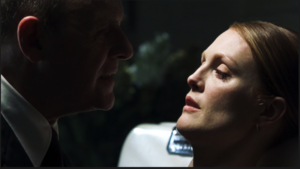
When I introduced the anti-villain, I gave Dr. Hannibal Lecter as an example. There are many reasons why Hannibal is one of the most fascinating villains in modern fiction. The notion Hannibal is redeemable is arguably one of the top reasons audiences like him.
Deep down, we know love has incredible power. I feel that—rightly or wrongly—it’s why we cannot seem to get enough of the Beauty and the Beast trope. We yearn to believe that with enough time, patience, love, understanding, we can “save” anyone.
While this can be a noble human trait, it can be a deeply foolish/flawed one as well.
Since I have slept since I read Harris’s books I will defer to the cinematic iterations. Part of how Hannibal keeps Special Agent Clarice Starling AND the audience off-balance is his lawful evil sense of right and wrong (and the romantic/sexual undertones that crackle throughout).
It is hard not to cheer for Hannibal when he’s taking out way-badder-bad guys. We find ourselves unwittingly rooting for him when he jeopardizes his freedom to return to the States and defend Clarice. Heck, the man cuts off his OWN HAND rather than hurt Clarice to escape.
HIS HAND! Not HER HAND!
Talk about mixed messages.
I Love You…to DEATH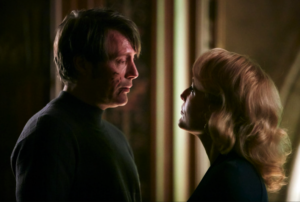
The Netflix series Hannibal further expounds on this deeply toxic “love” using Dr. Lecter and his therapist Dr. Bedelia Du Maurier (a character created for the series and not found in the books).
In Season One, the storyline intimates Dr. Du Maurier retired suddenly after a criminally insane patient attacked her (a patient Hannibal referred).
She barely survives, but the attacker does not. One guess on his fate?
Hannibal protects his own.Even Dr. Bedelia Du Maurier struggles to accept/admit what Hannibal really is—that he is an apex predator in a “human suit”—until MUCH later in their relationship. Why?
Sympathy for the devil. We simply do NOT want to give up on people. Again, noble quality, but one that can easily be our undoing.
Did Hannibal protect Du Maurier out of genuine care for her? OR did he see her as a useful tool to have in HIS toolbox? Remember, malignant narcissists do not inherently value other people; they value what others can do for/offer them.
Refer to: Weakness: Blood in the Water & Narcissist Sharks
Note I said that Hannibal referred the violent patient to his colleague. Was this an innocent referral that went terribly wrong? Or, did Hannibal a) know good and well that guy was a ticking bomb, and b) it was only a matter of time before he attacked/tried to kill, so c) Hannibal could be the right “hero” in the right place and time?
***Though I cannot be 100% certain, I’m fairly sure it’s really hard to turn on a person who’s saved you from a brutal death.
If, however, Hannibal is playing 3-D chess, we begin questioning his motive. Is there some glimmer of humanity within him waiting to be saved, or is it all a deepfake? When that question is never answered to our satisfaction, hope springs eternal.
“Woobie” Joker
My all-time favorite Joker is the Heath Ledger iteration in the 2008 movie, The Dark Knight.
In The Dark Knight, “woobie” Joker insinuates that his life, in some way, has been horrifically unjust (e.g. the grotesque scars across his face/mouth). There is a powerful scene where, for a moment, Joker ceases to be this unknowable madman and is a helpless, damaged child.
Or is he?
Can’t Bruce Wayne also relate to tragedy and gross injustice? HELLOOO??? How did he become Batman?
This is where we can start seeing the difference between the anti-hero and the anti-villain. One is redeemable, whereas the other is not.
Both Batman and Joker have tragic backstories, so where did they part ways? They parted at how those experiences ultimately shaped their worldview and goals.
Joker believes the world (Gotham) is broken, worthless and beyond redemption. Since the corruption is systemic, all that remains is to burn it all down and start over. And, if we’re gonna burn it all down, why not roast marshmallows on the flames? YOLO, right?
One doesn’t need to watch much of the news to at least empathize a little with Joker’s POV.
Joker believes there is nothing good about his fellow humans. Goodness is a facade. With the right lever, everyone can be moved off the bedrock of what they claim to believe.
***Harvey Dent proves Joker right. Good thing Dent is not the HERO of this movie.
What About “Woobie” Batman?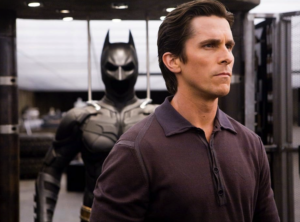
Batman (Bruce Wayne), also believes Gotham is corrupt and awful and maybe even irredeemable…but chooses to fight anyway. Unlike Joker, Batman refuses to give up hope and has faith in the unexpected goodness of his fellow human beings.
We see this dichotomy play out brilliantly in the story.
In the final act of The Dark Knight, Joker reveals two evacuation ferries—one carrying innocent civilians and the other hardened prisoners—are rigged to explode at midnight unless one group sacrifices the other. To Joker’s great vexation, the passengers prove out what Batman believes about humanity when they steadfastly refuse to kill each other even to save themselves.
Why I particularly like The Dark Knight is that Batman technically “lost” if we look at the story from a strict genre fiction expectation. In strict expression, the MC MUST take on the core antagonist in Act Three and prevail.
Yet, Batman didn’t do this as neatly as in other movies, all mano a mano. In a sense, he has victory by proxy. When prisoners and everyday people prove there is something about humans worth saving, it demolishes Joker’s entire argument.
This movie is more about beliefs than some showdown with a bunch of CGI and explosions at the end.
Batman even goes so far as to take the blame for the crime his friend, the corrupt(ed) D.A. Harvey Dent committed—AND give him the credit for saving the city—in order to preserve his friend’s memory as well as the hope of everyday citizens.
Batman’s (plot) loss is ultimately a win because he and the hostages disproved Joker’s raison d’etre that all humans are ultimately selfish and irredeemable.
“Woobie” Doobie Do….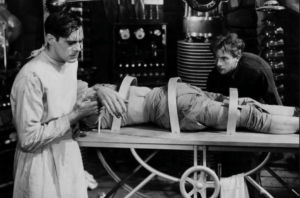
“Woobie” anti-villains are complex and relatable, which is why they’re a fan favorite. So was does the “woobie” do? The woobie anti-villain brings up so many age-old philosophical arguments we humans never can fully answer.
Are we a product of nature? Nurture? Both? Which is more important? Do we really have free will?
If we take two characters with similarly tragic backgrounds, why don’t they consistently choose the same paths? Not ALL people with traumatic childhoods become, say, serial killers and not all serial killers came from traumatic backgrounds.
For instance, with serial killers, one can argue that nurture drives behavior (Ed Kemper’s abusive mother).
What about nature?
There is a LOT of evidence to support that Jeffrey Dahmer suffered a TBI (traumatic brain injury) in early childhood when he had emergency surgery to repair a double hernia. Not just a TBI, but a TBI in the prefrontal cortex, the area of the brain responsible for emotions, empathy, and self-governance.
After the surgery, sources claim Dahmer was never the same, never “right” (we know this from reports from teachers, relatives, and those in his life). In light of knowing that information, do we blame nurture or nature? In his case, a traumatic childhood with a damaged brain.
Did Dahmer have the capacity to know right from wrong?
What about Frankenstein’s monster? The monster didn’t ASK for Dr. Frankenstein to play God. He never asked to be created and had zero choice in that decision.
Dr. Frankenstein, out of hubris, played God then abandoned his creation to a world where that creation would be forever feared, reviled and hunted. Was it orally acceptable for Dr. Frankenstein to play God while dodging his responsibilities, or should he “pay”?
Ultimately, who is the REAL villain?
Thoughts on “woobie” anti-villains?Other than “woobie” a very strange word? From Frankenstein’s monster to Sweeny Todd to Hannibal Lecter, it seems there’s no end to the fascinating twists and turns these characters deliver. Who are some of your favorites? Now that we are unpacking what an anti-villain is, does it clarify why certain tropes endure the test of time?
I LOVE COMMENTS!
To prove it and show my love, for the month of SEPTEMBER, everyone who leaves a comment, I will put your name in a hat (scroll down for August’s Winner).
I actually have landed agents for people who���ve won this contest. Agents like me because I make their lives easier.
***It���s been a short holiday week and I will post the winners next blog. Apologies.
If you comment and link back to my blog on your blog, you get your name in the hat twice.
What do you win?
The unvarnished truth from yours truly (and maybe even time with an agent).
I will pick a winner once a month and it will be a critique of the first 20 pages of your novel, or your query letter, or your synopsis (5 pages or less). People with superlative writing, I (with your permission) have been known to pass you onto an agent.
Anyway, I look forward to reading your comments and your writing!
AUGUST WINNER! Sydney Baily. CONGRATULATIONS! Thanks for the blog love and the support! Please send your 5,000 Word doc to kristen at author kristen lamb d0t c0m. Double-spaced, 12-point font, Times New Roman, one-inch margins (helps my eyes).
The post “Woobie” Anti-Villains & Sympathy for the Devil appeared first on Kristen Lamb.
September 8, 2023
Anti-Villains & Why We Love GOOD Baddies

Anti-villains are a type of character we haven’t discussed before. I’d almost venture to say that—while most of you have heard the term “anti-hero”—you might be a tad stumped on the term “anti-villain.”
*does mental gymnastics* *does them too close to curtains* *sets curtains ablaze*
Personally, I love learning about and teaching how to write amazing villains. Why? First of all, the hero (heroic party) is only as good as the opposition. Triumph in the face of ridiculously overwhelming odds?
Yes, please!
Yet, all that really has more to do with plot—stakes, goal, ticking clocks—as opposed to character. Why would we choose an anti-villain over a regular villain? Do we even need a villain? Are pants required?
***Sadly, yes, pants usually required.
Anti-Villain
To keep this simple, when we think of villains (in a default sense), it’s easy to conjure a “Black Hat” mustache-twirling caricature. You might be thinking, But Kristen, my villain has so much depth and suffering and, and…”
Hold on! I give extra credit for y’all at the end.
Last post, we talked about how to boil your entire book/series/story idea/TV pitch into ONE sentence.
Why is that important? When we boil our story down, we should be able to clearly see everyone’s GOALS, because goals are what make the critical difference here. Anti-villains can be very easily mistaken for anti-heroes (depending on how jaded one happens to be) and vice versa.
Anti-villains still have what the audience would consider an “evil” goal, but their motivations and WHY they want that goal is where the nuance comes in.
Case in Point: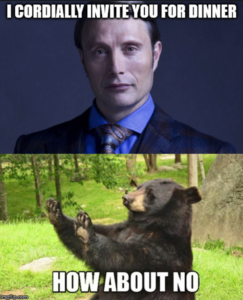
My dear friend and talented thriller author Allison Brennan and I have had a long-standing debate. Allison insists Dr. Hannibal Lecter is a villain, whereas I claim Lecter is, in fact, an anti-hero (cuz he only offs people who kinda deserve it).
Don’t you judge me! Y’all all know you were cheering at the end when he called Clarice to tell here he “was having an old friend for dinner.”
I’ve just keep this long-standing debate going, largely, to tweak with my Lawful Good friend’s sense of right and wrong (I tend to have a Chaotic Neutral streak).
Yet, the truth is I am wrong.
Yes, that IS ACTUALLY NOW IN WRITING.
Hannibal is technically an “anti-villain.”
Why an Anti-Villain?Why the anti-villain and not just a plain old regular villain? There is nothing wrong with a regular villain. Once we are finished here, however, I don’t know if y’all will ever see a “regular” villain again.
In fact, many of our favorite villains are favorites precisely because they refuse to neatly fit into their category.
As audiences grow increasingly sophisticated, the old tropes of noble good and pure evil are largely unworkable outside of genres like, say high-fantasy or speculative fiction. In speculative fiction, our protagonist might encounter a being from another dimension that is pure evil and okay. That’s fine.
Characters who are evil for the sake of being evil are terrible for genre fiction, but make excellent fodder for comedy and children’s cartoons.
Whenever we add in those additional layers that render our villain more nuanced and less “central-casting,” we could be tiptoeing around anti-villain territory.
Anti-Villains: Bad Deeds, “Good” Reasons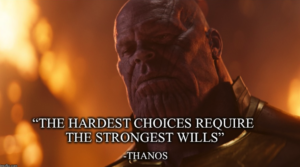
Two key questions differentiate the “anti-hero” from the “anti-villain”:
“What do they WANT?”
“What are they willing to DO to get what they want?”
A quick and convenient example might be Marvel’s villain, Thanos. For those who’ve slept through the last fifteen or so Marvel movies, Thanos is a supervillain self-appointed savior who’s goal is to “save” the planets of the universe…by murdering an “acceptable” percentage of the population.
*insert screeching record*
His contention is that resources are scarce (TRUE) and those who require resources too many (ok, TRUE). Add in his personal experiences with a planet devastated, and perfect anti-villain material.
Sure he WANTS to “save” the universe (TRUE in his mind), and the only way to do this is through randomly un-making billions of sentient beings (eh…NOT TRUE).
While plenty of folks might agree with his assertion that resources are scarce and we need to use wisdom in how we proceed, MOST people are not going to be cool with wholesale genocide.
Ultimately, HOW he is going about his goal is what makes him a villain.
Anti-Hero or Anti-Villain?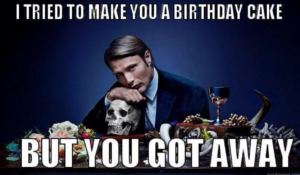
Why I LOVE, LOVE, LOVE anti-heroes and anti-villains is they are so mercurial. They’re slippery and not easily defined, and that makes them fascinating.
In The Silence of the Lambs, Special Agent Clarice Starling is the protagonist (hero), yet one could argue her greatest ALLY was Hannibal. She wouldn’t have had the first clue where to begin even looking for Buffalo Bill without Hannibal’s help.
Here, one could reasonably argue he is an anti-hero. Hannibal is partnering with “good guys” to take down an “even worse bad guy.”
But is he?
Or is he playing 3-D chess and sees the long-game? That all the chaos will ultimately give him the opening to freedom.
Probably that.
Doing GOOD then, ultimately, only serves to FREE him to conceivably resume doing bad things (which he does).
Yet, like I mentioned earlier, most people DID cheer when he was following the head of the asylum at the end. Why would we cheer?
It’s one of those micro-moments where Hannibal is an anti-hero. He’s willing to jeopardize his freedom to a) make sure Clarice is okay and to b) exact punishment on a terrible human being who’s been victimizing/terrorizing/exploiting the most vulnerable in society.
Hannibal is definitely a villain, just he operates by a CODE that many people can respect.
In the second movie, Hannibal would have happily left the Italian detective alone had he followed the rules (rules are VERY important to Hannibal). Instead of upholding his oath as an officer of the law to protect and defend the public, however, the detective goes all mercenary because he wants the bounty that the monster millionaire Mason Vergen put on Hannibal’s head.
Not okay with Hannibal at ALL.
Ant-Villain & Law Abiding Citizen
Thanos, Darth Vader, and Hannibal Lecter are definitely among the most memorable and compelling villains on the page AND on the screen. I believe this is due in large part to their depth. They are very layered and have nuance…like actual people (anti-villains).
But what if we don’t want interstellar dictators or even serial killers? What if we just want a…regular person.
So glad y’all asked.
Probably one of my all-time FAVORITE movies is Law Abiding Citizen. When we talk about the different TYPES of anti-villains, the most dangerous is the “Villain in Name Only.” This villain isn’t, per se, evil and he has entirely different reasons for the fight with the protagonist.
His POV is extremely sympathetic and can toss our MC (and the audience) into deep moral crises.
In Law Abiding Citizen, Clyde Shelton is happily enjoying Christmas at home with his family…until he and his loved ones are the victims of a home invasion. The two perpetrators incapacitate Shelton then force him to watch as they brutalize his wife and young daughter before murdering them. Then, they set the house ablaze leaving him for dead.
Nick Rice, the prosecuting attorney, is the “good guy.”He promises justice for Shelton’s dead loved ones, but then….
After evidence is mishandled, Rice’s case threatens to completely implode. Much to his own chagrin, he can only secure the death penalty for one of the offenders. In order to do this, however, he must agree to a slap-on-the-wrist plea deal for the other perpetrator (one that will set him free in a couple of years).
Ten years later.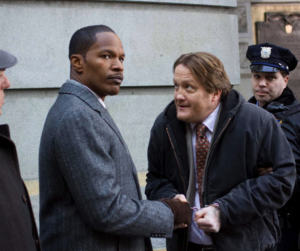
Shelton summarily goes on the war path against a corrupt justice system filled with backroom deals, plea bargains, and other bull$%ittery….
…and can we blame him?
Those home invaders had NO IDEA who they actually messed with, and Rice genuinely wanted to do GOOD. Yet, even he would be hard pressed to say what he got for Shelton’s family was “justice.”
All the way to the END of the MOVIE, I was somewhat rooting for Shelton (technically the villain). And I was not alone!
It’s also hard for the protagonist, Rice, to feel like Shelton is truly “the bad guy.” Not only is he disgusted he had to even offer that horrid plea deal to begin with. He of all people KNOWS the system is jacked up and flawed and imperfect, but—sadly—it’s the best one we have.
Neither man is wholly wrong…and THAT is why this story and those like it, are so darn amazing and memorable.
The Anti-Villain Says More About YOU…than anything else.

One of the reasons anti-heroes and anti-villains are so easy to confuse is because, first of all, they are complex. How many all bad or all good people do YOU know? So there is that. Yet, they are still villains…or are they?
THAT is the critical question.
Non-fiction, to me, is learning through information. Fiction is still learning, just learning through imagination. This is uniquely true when it comes to appreciating the full spectrum of human emotions and experiences. Anti-villains are fantastic for this.
It is one thing to read some cold distant analysis like from the DSM-V. This diagnostic manual can tell us ALL about psychopathy, sociopathy, megalomania, narcissism, etc.
But fiction lets us LIVE it…from ALL sides.I took the Clifton Strengths test and one of my core strengths is BELIEF. My sense of right and wrong, just and unjust make me who I am.
So, in Law Abiding Citizen, when Shelton (a former DARPA engineer) decides to burn down all the people responsible for such a disgusting miscarriage of justice?
It is almost impossible for me not to be on his side…at least a little.
When Hannibal took out Dr. Frederick Chilton? Not one fig given. When he kills Mason Vergen? Again, horrible human being and—because Vergen is rich and powerful—Hannibal the only one who CAN take him out.
And I think I should stop there….
Why Do We Love/Hate Characters?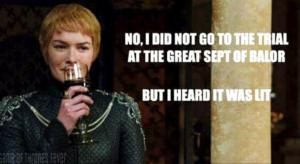
My somewhat dubious moral compass is obvious when we look at characters I love and hate. A therapist would have LOADS of fun hearing my opinions of A Game of Thrones.
Anyway…
Law & Order: S.V.U. I LOVED Elliot Stabler and HATED Olivia Benson, and it is all because of one episode.
A child-killer is toying with the N.Y.P.D. and sealing little kids away with a finite amount of air. Then, the killer leads the police on a merry chase while children slowly suffocate.
During the pursuit, Stabler and Benson KNOW they have the guy, and he’s playing games. It’s nothing they can really prove, more instinct. What is worse is they only have about an hour before yet another child smothers to death.
Elliot does the right thing (in my mind). He waterboards the @$$^&le in his own toilet until he coughs up the location of the final child…along with about a gallon of water and his right kidney.
…and Olivia turns him into Internal Affairs.
Because she is Lawful Good.To her, the ends do not justify the means. Elliot, conversely, is willing to risk losing his job by betting on his instincts. It is worth his career or even freedom so long as that child lives.
I can relate to that much more (which is why we are happy I became a WRITER  ).
).
And that is awesome and kind of scary, too. It is unsettling to acknowledge one’s “darker” inclinations, but I feel we are deluding ourselves if we think we are devoid of any. Everyone has a dark side, and (to a degree) there is nothing wrong with that. I feel it is tremendously healthy to know and accept one’s flaws and limitations.
Anti-villains are a great mirror to gaze into for some perspective.
This is why fiction is AMAZING! …and scary
We can live vicariously through other characters and experience the world in a far richer way. Stories allow us a way to face our fears, meet our dark side, consider the world from a different perspective.
Ultimately, whether a character is considered an anti-villain or anti-hero, largely depends on the time period, the culture, and the individual viewer. How we categorize those amorphous characters says way more about us than the author ever intended.
And if you ever meet me and Allison Brennan? Our “debate” makes total sense. We are different people with different experiences and backgrounds and ALL of that colors our world.
***She’s clearly the goody-goody *rolls eyes*
So what do your favorite characters say about YOU?
What are your thoughts on anti-villains?What do your favorite characters say about you? Have you ever heard of the “anti-villain”? Do you see where we could easily get into a debate whether or not we have an anti-hero or an anti-villain? Any examples of anti-villains you’d like to add from the page or screen?
I LOVE COMMENTS!
To prove it and show my love, for the month of SEPTEMBER, everyone who leaves a comment, I will put your name in a hat.
I actually have landed agents for people who���ve won this contest. Agents like me because I make their lives easier.
***It’s been a short holiday week and I will post the winners next blog. Apologies.
If you comment and link back to my blog on��your��blog, you get your name in the hat twice.
What do you win?
The unvarnished truth from yours truly (and maybe even time with an agent).
I will pick a winner once a month and it will be a critique of the first 20 pages of your novel, or your query letter, or your synopsis (5 pages or less). People with superlative writing, I (with your permission) have been known to pass you onto an agent.
Anyway, I look forward to reading your comments and your writing!
The post Anti-Villains & Why We Love GOOD Baddies appeared first on Kristen Lamb.
August 31, 2023
Pitch Your Story in a Pinch (ONE Sentence)

Pitch your ENTIRE novel, series, whatever in ONE sentence. Yes, it CAN be done. It can be done and it MUST be done, especially for those who want to be PAID to write. If you want to make income from your ideas/writing, you must master the pitch.
Why? First, a great log-line (pitch) can help you immediately spot the flaws in a story. WAY easier to fix a small prototype. Secondly, when you get writing, it is easy to get lost in something so vast as a novel. The log-line serves as a sort of “true north” so that epic high fantasy doesn’t suddenly involve space aliens, time travel, and GF waffle recipes.
Lastly? Better to need and not have than have and not need.
Fortune favors the prepared. Who knows what opportunity might present itself and are you prepared to take max advantage? You might only have a minute or two to impress an agent, producer, director, etc. WHY is your idea is better than the competition?
Additionally, even beyond these fine reasons, simply knowing how to pitch opens up opportunities. I’ve landed book deals, feature articles, been included in some major anthologies, and more simply because I could give an editor a one-sentence pitch and sell my IDEA…then deliver a great story or article.
What do I use for the pitch? A concept we’ve talked about called the “log-line.”
Pitch in a Pinch with a Log-Line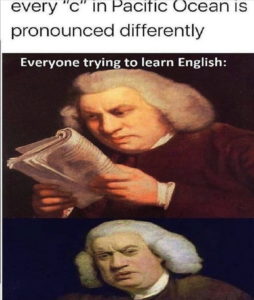
I introduced this concept ages ago in the post, Writer���s Block: Is It Laziness or a Critical Part of Being a Longtime Author? Today we’re going to deep-dive exactly HOW to boil our novel down to a single sentence. Some of you might be wondering if I was trying to give you a heart attack with my title. Maybe you believe this feat is impossible. AN ENTIRE NOVEL IN ONLY ONE SENTENCE?
Maybe something simple, plebeian and commercially formulaic *flips hair* but ART cannot be forced into a box.
Yes. Yes it can.
I know, I know. Your novel is almost five-hundred pages with made up technology and wizards and folding space using enchanted Thigh Masters….
I hear you. Calm down.
A log-line is a lifeline that will allow you to pitch a novel (or series) in ONE—YES ONE—sentence. The log-line is going to save you time, energy, and sanity (save the crazy for the fiction).
We’ll get to how a log-line is going to do ALL this AND give you six-pack abs in only five minutes a day in a moment…
***Legal Disclaimer: Consult your psychiatrist before believing any writing tool will give you six-pack abs. The giant pink bunny in the corner lies, too FYI.
Anyway, pitch, pitch, b–pitch…I used to try to teach story structure from the perspective of an editor, but I found that my approach was flawed. Why? Because editors are like building inspectors. We have skills best used on a finished product. We’re trained to look for structure problems.
Is that a good skill? Sure. But do building inspectors design buildings?
No.
Architects do. Architects employ creativity and vision to create a final structure. Hopefully, they will have the necessary skills to create and design a structure that will meet code standards.
Creativity and vision are not enough. Architects need to learn mathematics and physics. They need to understand that a picture window might be super pretty, but if they put that sucker in a load-bearing wall, they won���t pass inspection and that they even risk a fatal collapse.
Aestheticism must align with pragmatism.
This insight made me step back and learn to become an architect. When it comes to plotting, I hope to teach you guys how to have the creative vision of the designer, but with the practical understanding of an inspector.
We’ve discussed how plot works on a micro-scale (scene and sequel). After that, we panned back for an aerial shot, and discussed how great stories–like amazeballs rollercoasters—are addictive by design.
I’ve also covered how the single most important component to plot is the opposition, and l even have a tested method to make sure your core idea is actually solid enough to be the foundation for an entire novel.
So what’s this log-line pitch thingy?Basically, we should be able to tell someone (an agent, editor, producer, director, potential reader) what our story is about in one sentence. That is called the “log-line.” Log-lines are used in Hollywood to pitch movies.
In this post we’ll cover two different types of log-lines. One is the big picture of your story idea. We’ll cover that first.
But, if you read this earlier post, I presented a formula for you to use before you even start writing your book. This is the more functional log-line. Think of this second type of log-line as your story prototype. It is a scaled down version to make sure you have all the critical story pieces and YES, it will reveal the whole story.
More on that in a bit….One resource that should be in every writer���s library is Save the Cat by Blake Snyder. It���s a book on screenwriting, but every writer can benefit enormously from Snyder���s teaching.
In the world of screenwriting there is a tenet, ���Give me the same, but different.��� This axiom still holds true when it comes to novels.
Our story cannot go so far off the deep end that readers cannot relate, yet our story needs to be different enough that people don���t just think it���s a retread.We as writers have to negotiate this fine balance of same but different, and that is no easy task.
So let���s look at components of a great pitch (log-line):
A great pitch is short and clear.
I cannot tell you how many writers I ask, ���So what���s your book about?��� and they take off rambling for the next ten minutes. Often why writers are so terrified of the pitch session is that they cannot clearly state what their book is about in one to three sentences.
Here is a little insider information. When we cannot whittle our entire story into a maximum of three sentences, that is a clear sign to agents and editors that our story is structurally flawed. Not always, but more often than not. Your goal should be ONE sentence. What is your story about?
A good pitch is ironic.Irony gets attention and hooks interest. Here���s an example:
The Green Mile is about the lives of guards on death row in the rural Depression Era South leading up to the execution of a black man accused of rape and child murder who has the power of faith healing.
What can be more ironic than a murderer having the power of healing? Or guards having to stand up against a dysfunctional society to do the right thing? Think of the complex emotions that one sentence evokes, the moral complications that we just know are going to blossom out of the “seed idea.”
A good pitch is emotionally intriguing.A good log-line tells the entire story. Like a movie, you can almost see the entire story play out in your head.
During a preview tour, a theme park suffers a major power breakdown that allows its cloned dinosaur exhibits to run amok.
Didn���t you just see the entire movie play out in your head with that ONE sentence? Apparently Steven Spielberg did, too and that���s why he took Michael Crichton���s novel Jurassic Park and made it into a blockbuster movie.
A good pitch will interest the potential audienceGood log-lines exude inherent conflict. Conflict is interesting. In Save the Cat, Blake Snyder relays stories of how he would take his log-line to local coffee shops and ask total strangers what they thought about his idea.
This is a great exercise for your novel.
Pitch to friends, family, and even total strangers and watch their reaction. Did their eyes glaze over? Did the smile seem polite or forced? If you can boil your book down into one sentence that generates excitement for the regular person, then you know you are on a solid path for your novel.
Yet, if your potential audience looks confused or bored or lost, then you know it is time to go back to the drawing board. But the good news is this; you just have to fix ONE sentence.
You don���t have to go rewrite, revise a novel that is confusing, convoluted, boring, arcane, ridiculous, etc.
Think of your one sentence as your scale-model or your prototype. If the prototype doesn���t generate excitement and interest, it is unlikely the real thing will succeed. So revise the prototype until you find something that gets the future audience genuinely excited.
You have your log-line. Now what?
Your log-line is the core idea of your story. This will be the beacon of light in the darkness so you always know where the shore is versus the open sea. This sentence will keep you grounded in the original story you wanted to tell and keep you from prancing down bunny trails.
The Fear FactorFear is probably the most common emotion shared by writers. The newer we are the more fear we will feel. A side-effect of fear is to emotionally distance from the source of our discomfort.
This is why so many first-time novels fall apart.I can tell everything that is wrong in a novel with a single glance at the log-line. Conversely, I can tell a writer what precisely needs to be fixed by looking at the log-line.
Does the story have a core problem? Is it a large enough/interesting enough problem to merit a whole novel? What are the stakes? Is there a ticking clock or have we given the MC forever to get around to accomplishing the goal?
If you’re like me and botched your first (hundred) attempts to write a novel, RELAX. It takes time to develop the level of sadism required to write spectacular stories. Not everyone is a born psychopath like George R.R. Martin.
New writers (in particular) tend to shy from any source of conflict, but conflict is the life blood of fiction. Log-lines can show us our story is flat-lining and WHY.
One of the best ways to learn how to write log-lines is to go peruse the IMDB (Internet Movie Database). Look up your favorite movies and see how they are described.
You can even look up movies that bombed and very often see the log-line was weak and the movie was doomed from the start. Look up movies similar to the story you are writing. Check out movies similar to the story you want to tell.
Your Log-Line As Prototype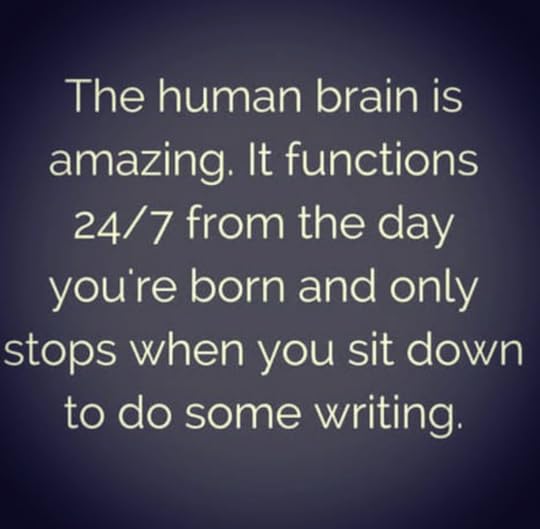
Some of the above examples are fantastic to pitch a book to, say, an agent. We still get an idea of the story. If cloned dinosaurs start running amok in a theme park, then one gets the idea that there are probably people stranded/in danger and that the point of the story is to a) escape and b) do something about the dinosaurs.
This is good enough but isn’t as specific as I would recommend if, say, you’re planning a new novel for this year’s upcoming NaNoWriMo, which is why I recommend using a certain formula.
Why is this so important?Think about an architect responsible for a sky scraper. Such a large building will require a ton of money, materials, and time, so what does the architecture firm do first? They create a scaled down replica before ever breaking ground. This makes it far simpler to see critical flaws or areas that could be enhanced.
Same with a car manufacturer. Engineers have a fabulous idea for a new super car? They don’t simply start building a full-size, fully operational super car. They begin with the prototype. This saves time, effort, energy…and heavy drinking.
It’s the same for a novel. It is SO much easier to spot any problems with the log-line and tweak THAT, then it is to kill yourself writing 70,000-110,000 words only to THEN try and go BACK and try to figure out why the story isn’t working.
Here is the formula I use to create a solid log-line (story).Intriguing protagonist + active verb + core story problem (antagonist/Big Boss Troublemaker) + stakes + ticking clock.
Log-lines are like Legos. Pop one piece off or change another and TOTALLY different (better) story.
Notice I Said “Intriguing Protagonist“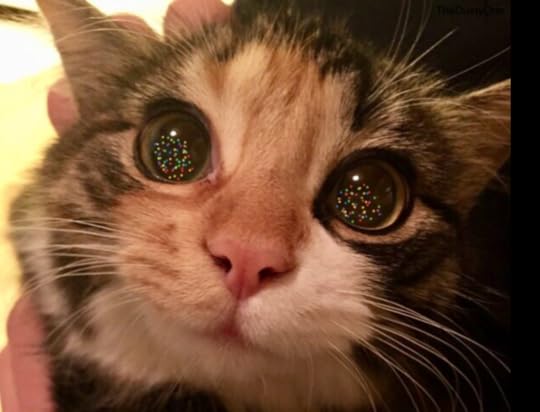
If I write a log-line that says:
Susan must locate her birth mother and convince her to donate a kidney before her daughter dies from an incredibly rare genetic disease.
At first glance it seems I have all the pieces, right? I have an active goal (locating birth mother for kidney). There are HIGH stakes (daughter could die and we are dealing with a rare genetic disease so unknown grandparent is likely only option) and a ticking clock (daughter will not last long without a kidney).
But who the heck is Susan? What did I say that gave y’all ANY idea about who she is? This is where that “ironic/intriguing” will help you out. Ideally, we want to cast the protagonist who will have the toughest time talking someone out of a kidney (as if that isn’t already difficult).
Example A:A recently divorced, overworked stay-at-home mom must locate her birth mother and convince her to donate a kidney before her daughter dies from a rare genetic disease.
Here we now have a clearer picture of our protagonist, and this is a perfectly great log-line depending on genre and how gritty you want to write. But a stay-at-home mom isn’t a super hard sell. She’s feasibly been abandoned (first by mom then later by her husband). She’s rather sympathetic.
We get she was adopted and there are plenty of challenges ahead, but once she reunites with her birth mother, the tough part, by and large, is seeing if a stranger is willing to part with a kidney.
Example B:After serving ten years of hard time for drug trafficking, an estranged mother recently reunited with her child must locate her own birth mother and convince her to donate a kidney before her daughter dies from a rare genetic disease.
See how this alteration changes the entire feel of the story as well as the stakes for all involved? Now we are dealing with a woman crushed by guilt, struggling to reenter society and remain clean.
The one dream that probably kept her sane in prison was that she would one day hold her daughter again. Though she IS reunited with her daughter, she regains custody from the courts just in time to watch her child die…unless she can perform this HERCULEAN feat.
We know from the log-line she will find the woman who put her up for adoption, but instead of Susan the sympathetic homemaker, she is Susan with the track marks, bad tattoos, and a history steeped in shame. Serious guilt/shame because, had she not done so many hard drugs, she would have been a perfect match for her daughter, but her kidneys are tainted with Hepatitis (just raising those stakes there).
Both log-lines would make excellent stories, just one is far grittier from the get-go. See how, by simply changing blocks around, we can completely change the entire story? I hope this example helped clarify the whole “log-line” concept.
So here is an exercise to create a pitch.See if you can state your novel in one sentence. It will not only help add clarity to your writing and keep you on track, but when it comes time to pitch an agent or hook readers to BUY, you will be well-prepared and ready to knock it out of the park.
Practice on your favorite movies and books. Work those log-line muscles!
What are your thoughts?Does this make plotting seem more doable? Outlines make my left eye twitch, but I find this trick very handy. Can you now see the component parts of a good story more clearly? Feel free to test out your log-line in the comments. There are no NEW ideas. I share ideas all the time, because everyone has a unique voice. Just know I reward bravery.
I LOVE COMMENTS!
To prove it and show my love, for the month of AUGUST, everyone who leaves a comment, I will put your name in a hat.
I actually have landed agents for people who���ve won this contest. Agents like me because I make their lives easier.
If you comment and link back to my blog on your blog, you get your name in the hat twice. For those who listen to the PODCAST (mentioned LAST POST), y’all get THREE times in the hat.
What do you win?
The unvarnished truth from yours truly (and maybe even time with an agent).
I will pick a winner once a month and it will be a critique of the first 20 pages of your novel, or your query letter, or your synopsis (5 pages or less). People with superlative writing, I (with your permission) have been known to pass you onto an agent.
Anyway, I look forward to reading your comments and your writing!
The post Pitch Your Story in a Pinch (ONE Sentence) appeared first on Kristen Lamb.
August 25, 2023
Change Happens: Acceptance vs. Resignation

Change is part of life. Anything that is living, should be growing (or even healing) which means it changes. Only dead things remain the same. This is true with people as well as industries.
Last post, we talked about the darkest moment, what it is and why it is so critical to story. It is at the darkest moment that the protagonist finally lets GO of the old self, the old ways, the old thinking and embraces the new.
Now, here is a critical point. Not ALL stories have a “happy ending.” Unless one is writing romance and a “happily ever after” is part of genre canon, our story does not have to have a happy ending, BUT it must always have a satisfying ending.
Yet, what does that mean? What is the critical component of the darkest moment that transforms the protagonist into a hero?
Any other person would resign themselves to whatever fate, whereas a protagonist-turned-hero, accepts what has happened, that “all is lost”…but presses on anyway with the hope that a) everything was lost for a good cause/reason b) the stuff that was lost needed losing c) what lies ahead will more than make up for what was lost.
Acceptance vs. Resignation
We all have “stuff” we don’t like. Maybe it is a personal flaw (out of shape) or something in life we dislike (unemployed or underemployed). It might be a crazy family we love but struggle to have good boundaries with. Whatever.
They key to positive change in anything is acceptance. If we don’t get to a state of acceptance, then by default, we are in denial. If you are unfamiliar with the K��bler-Ross, 5 Stages of Grief, I recommend checking it out. There is a LOT of applicability to dealing with all forms of loss, not merely losing a loved one.
***For the record, change implies some kind of loss.
According to Swiss-American psychiatrist Elisabeth K��bler-Ross, we go through five stages whenever we are hit with bad news (a death, a bad diagnosis, a heartbreak, losing a job, natural disaster, major upsetting change, etc.)
Denial AngerBargainingDepressionAcceptanceAccording to K��bler-Ross’s idea, we won’t neatly scroll down these stages one by one. We could get stuck on one, like anger. Or, we might vacillate back and forth from, say, depression back to anger to acceptance, then slip up and be right back in depression. So on and so forth.
Yet, note we must make it to then through acceptance in the final stage. Until we accept the situation, we cannot move on, and, until we move on, there is no room for new hopes and dreams.
This last bit, to me, is the kicker. We need to make room for new hopes and dreams. That is where acceptance, to me, differs from resignation.
Resignation is the shadow-side of acceptance.
In fact, if we look to a lot of villain origin stories, they fell prey to resignation whereas the hero takes up the mantel of acceptance.
Be the Hero in Life & Career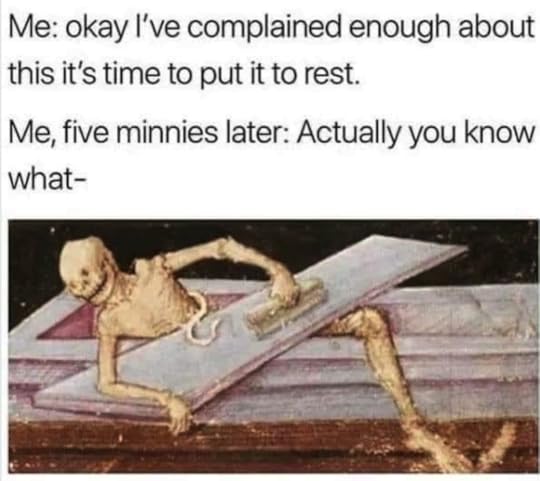
All change involves death of something.
When I chose to become a career writer, by default, the dream of being an attorney died. I’d applied for law school while I was fiddling with the idea of going pro. Somehow, I didn’t get the letter I’d been accepted into the class of 2005 at my law school of choice. I’d assumed I had NOT gotten in, and so I accepted a job as a technical writer…the DAY I got the letter for freshman orientation.
I could have reasonably gone back on my word. But, that isn’t me. I felt it was a sign that being a writer was the right way forward.
Theoretically, I could have managed both (I still could have accepted a slot in law school). But could I? Really? No. I was at a crossroads. I needed to accept that, while it was amazing I got into such a prestigious school, I really wanted to be a writer.
***For the record, y’all make me SO grateful I became a writer.
I had to let one dream DIE for another to LIVE.No sooner did I decide to get into writing as a career that I realized everything was changing. While it was an exciting time to be an author, it was a terrifying time as well.
And yes, I had times I thought that maybe I should just hang it all up and go to law school. OMG, I chose wrong! What did I DO? On and on. But to be locked into that kind of double-mindedness is maddening.
I’d decided to be a writer, and, as a writer of the 21st century, that meant I had to accept that the publishing paradigm was not only going to change DRASTICALLY, but the pace of change was only going to accelerate.
I still have to accept this. It is never easy. Yes, I wanted the dream where all I did was hide in my little dream cottage and write novels fans adored. My agent, editors and PR people would handle everything else. But that is not reality (and never really has been).
Change and Learning to Pivot
IF I want to keep this writing dream, then I need to accept all it entails. Because if I don’t, it only sets me spiraling back through anger, depression, denial, and on and on.
Pivoting sounds like such a pretty and painless word, doesn’t it?
Um…yeah. All fun and games ’til someone takes out a knee.
I don’t know about y’all, but I JUST about figure out, say WordPress…then they New and Improve it, and back to the beginning. It feels as if I am constantly having to reimagine, rethink, reinvent…because I am. In ways, this is good because it prevents stagnation. At the same time? I feel like I need Digital Dramamine from all the ups and downs and twists and turns.
When I came back from presenting in Idaho, I posted, Aspiring Writers Need to Quit, Now! Why? Because I was blessed enough to hear a lot of speakers who completely turned my thinking on its head (which doesn’t happen that much).
When I arrived at the conference, I was in a terrible state of burnout. Why? I needed a paradigm shift.
I’d gotten stuck, which happens.
Remember that list? Bargaining? Depression? What had gotten lost—other than ME—was my why. WHY did I want to be a writer? Then, once I remembered my WHY, I had to accept that IF I still want to be a writer in the 21st century, that can look a zillion different ways (unlike pre 21st century authors).
In the old days, I had only a handful of options. Now? There are so many options I actually think my brain vapor-locks daily.
Say Yes to Acceptance, No to Resignation
When we fall prey to resignation, it makes us angry, bitter and rigid. When we are rigid, we don’t bend, we break. Or, for us overachievers/drama queens…we shatter.
It was really hard to blog for a while, not only because so much was happening on the family front, but my career felt like it imploded with the pandemic.
Did it? Yes. Did it really? No.
My career didn’t DIE, it merely changed. I was in a different season. In autumn, the trees aren’t dying, they are preparing for winter. This is when they’ll rest and drive their roots down deeper so they can be stronger in the future, thus be able to weather spring storms and summer droughts.
We don’t CRY in autumn, most of us LOVE it! If we don’t cry for the trees, why do we cry for the me-me-mes?
I had to grieve the old, accept that the changes keep coming, and that I have to stick-and-move if I want to remain in the game and see the SPRING.
If I DON’T? That is totally okay, too.
Writing CAN Change BACK into a Hobby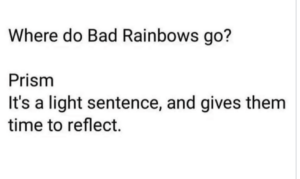
Not everything we love has to be monetized. It also doesn’t need to be permanent.
If you get a chance, go check out that post I mentioned earlier. Also, grab the book, Dear Writer, You Need to Quit, that inspired the post.
Also, since it is FRIDAY, I am going to leave y’all with an interview with ME. I know, it feels so self-serving, but it really turned out very funny. I hope it’s the shot in the arm y’all might need as we press into a new school year (I can see y’all sniffing the school supplies).
If you ever want to feel really brilliant, just know I did all the dumb things so you don’t have to. I met Carissa Andrews at the same conference in Boise and just WOW! I was floored when she asked to interview ME over at Author Revolution Podcast.
Psst! Carissa runs the Millionaire Author Manifestation.
Carissa is an internationally best-selling author with 15+ titles. She’s reached the status of millionaire author, and so she took what she learned and now uses that to help other writers.
Wow, right?
Unicorns DO Exist (I met her)Y’all can go check out her website for all her testimonials and classes. Suffice to say, I was very honored and humbled she cared to interview ME.
We talk a lot about the ups and downs of this industry. The podcast IS long, so maybe listen on your phone. I can be FUNNY or I can be BRIEF, so I choose funny.
Anyway, when we accept that YES, being an author is amazing…but it is also crazy as a bag of frogs? We can then move forward, get UN-stuck from the Feedback Loop of Despair, and open up to for fresh dreams and new roads untraveled.
What are YOUR Thoughts on CHANGE?
Do you struggle with change, and telling the difference between acceptance and resignation? I did. People were always telling me I had to accept whatever and I took that for giving up (resignation). Only recently did I hear a podcast that pointed out the difference.
Do you struggle with acceptance, too? Get stuck back in the other stages of grief? Is change overwhelming? Am I the only one who wishes we could have a PAUSE button for the CHANGE?
I LOVE COMMENTS! Would also LOVE y’all top check out the interview. If you don’t want to listen via Youtube, I linked to all the places y’all can subscribe to Carissa’s podcast.
To prove it and show my love, for the month of AUGUST, everyone who leaves a comment, I will put your name in a hat.
I actually have landed agents for people who���ve won this contest. Agents like me because I make their lives easier.
If you comment and link back to my blog on��your��blog, you get your name in the hat twice. For those who listen to the PODCAST, y’all get THREE times in the hat.
What do you win?
The unvarnished truth from yours truly (and maybe even time with an agent).
I will pick a winner once a month and it will be a critique of the first 20 pages of your novel, or your query letter, or your synopsis (5 pages or less). People with superlative writing, I (with your permission) have been known to pass you onto an agent.
Anyway, I look forward to reading your comments and your writing!
The post Change Happens: Acceptance vs. Resignation appeared first on Kristen Lamb.
August 16, 2023
Darkest Moment: Why Losing Everything Matters

Darkest moment is a term you’ll hear a lot, especially when learning how to plot. Last post, we discussed how critical normal world is for hooking the reading audience early, then never letting go until THE END. Every piece of the “plot” serves a critical function and understanding that function, I feel, makes us better writers.
Oddly, as many years as I’ve been blogging, I don’t recall ever dedicating an entire post to exploring the “darkest moment,” what it is, why it matters, and the difference it can make in the overall quality of our stories.
Why “darkest moment” as a topic?
I can’t talk about it, but my family was hit with a major tragedy unlike anything I’ve ever experienced.
At close to fifty years old, I’ve been through many losses, but nothing like this. Just imagine bad, then multiply that by a factor of a thousand. I only thought I understood the darkest moment until this summer.
***It’s okay. We’ll get through it. We are slowly righting from the blow, but it is/was…bad.
And, since we writers are a thrifty lot, nothing in life ever goes to waste…especially trauma.
What is the Darkest Moment?
Seems like a simple answer, but is anything but. Commonly, we hear that the darkest moment is that point in the story, close to the end of the book/movie, when the main character (usually the protagonist) loses all hope. We ALL know this point, even if one is not a writer.
All of us have watched a movie where it looks like the good guys totally have it handled, the plan is brilliant and SURELY they’re going to win.
But wait…there’s thirty-five minutes left in the movie.
We (the audience) inherently sense something is up.
The team is ready, we have had the montage and are ready for ANYTHING!
*sings* If you need to learn a lot in a really short time, you need a montage! A montage!
Or we read a book. Same thing happens. SURELY the character(s) have this down! What can go wrong? Except there’s another fifty pages remaining. Something definitely sus is going on there.
So WHY?
Everybody Arcs
A novel has a LOT of moving parts. Nothing about writing fiction is easy. We are tasked with creating a captivating story that can span anywhere from 50K to maybe as many as 200K words (think Lonesome Dove or Pillars of the Earth).
We need to have a plot, tension, conflict, relatable characters, great dialogue, immersive prose, pacing, theme, world-building, character arc, plot arc and on and on.
Also, the difference between reality and fiction is that everything in fiction has to make sense.
*nods to Tom Clancy*
In life, random bad things happen ALL the time. There is no rhyme or reason. In fiction, however, everything is cause and effect. Everything has to be planned (at least from our end, the author).
Whenever we come up with a plot/story idea, we have to cast the story. Ideally, the MC/protagonist lacks some critical element that would mean immediate defeat. The MC must endure the story gauntlet to even hope to succeed against the antagonist.
Maybe they don’t have enough knowledge, training, or confidence. Think newbie FBI agent, Clarice Starling, in Silence of the Lambs. Perhaps they’re a loner who needs to be better at relying on a team (E.g Tony Stark/Iron Man).
Perhaps they’re too clingy and need to venture off away from toxic “support” that is actually holding them back. Think Evelyn Couch in Fried Green Tomatoes (based off Fried Green Tomatoes at the Whistle Stop Cafe) .
They have no choice BUT to evolve and grow. As the late, great Blake Snyder said, “Everybody arcs!”
False Gods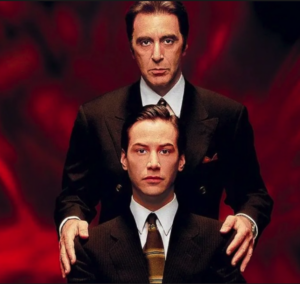
When I teach character creation, I challenge writers to ask one question about all the characters, but the protagonist and antagonist in particular.
What is their false god?
Can you name what THING the MC falsely believes is the solution to all their problems?
Is it more money, status, power? How many stories have we seen where an MC loses their way chasing power? Devil’s Advocate is a great example. The most powerful law firm on the planet recruits Kevin Lomax, a small town, idealistic young public defender who’s never lost a case.
Ultimately he has to choose between unlimited power and his conscience.
What about someone who’s false god is “freedom” which actually isn’t freedom at all, rather it’s really just avoiding responsibility?
In Michael Connelly’s The Lincoln Lawyer, defense attorney Mickey Haller is terrified of responsibility. He never defends ANYONE he even remotely thinks is innocent and only takes cases for (basically) scumbags.
Why?
Because he did defend an innocent early in his career, lost the case, and the kid he defended is sitting on death row. He cannot bear to go through that again. Haller worships his self-delusion that he doesn’t actually care about innocence and guilt…but does he?
In Bridget Jones Diary, Bridget (NOT a lawyer) genuinely believes losing weight and finding love will make her whole. Her false god is this rather superficial view of life, love and romance.
Why False Gods?
If we look at all civilizations throughout human history, it’s easy to see that we are wired to worship something. What do “gods” usually have? Altars. What do worshippers place on an altar in return for “favor”?
Those things they prize the most.
Thus, if we have an MC who dedicates his life to being the best, the richest, the most powerful, whatever…what is he likely sacrificing on that altar?
Anything that actually is worth having: love, family, friends, relationships, etc.
Because he is (possibly) operating out of a WOUND (growing up poor), his vision is distorted as to what exactly he needs and what would ultimately make him happy/safe/fulfilled.
And I just gave y’all the plot to probably fifty Hallmark movies.
No shade on Hallmark, because they do a brilliant job of telling stories audiences love and can relate to. Even me, the gritty, weird horror/speculative fiction writer.
We all cheer when the filthy rich workaholic FINALLY has an epiphany that he’s empty and alone and has been accepting a shill over true bliss. His net worth might be billions, yet it is all meaningless without (insert whatever HERE).
And we can do this with all kinds of “false gods.”

Bridget Jones eventually sees the truth about Daniel Cleaver, the man she’s been obsessing over. He’s narcissistic and shallow (and, to her eventual chagrin, a reflection of who SHE is). Over time, as she matures as a person, she sees the “antagonist” Mark Darcy in a new light.
Darcy, a man that initially drove her to madness, actually is the real deal. He represents a romance with roots, one that can endure. Love isn’t always shiny with bows and ribbons and loving for the long haul requires learning to accept flaws (like her extra few pounds and Darcy’s often acerbic nature).
Darkest Moments are Pivot Points
Why the darkest moment is so critical is because it marks the point in time just before the breakthrough. Everything our MC has relied on–connections, money, power, family, bright ideas, super powers, good looks, charm, etc.—FAIL them.
When I teach structure, I “joke” that Act Two is really a bunch of increasingly dumber (smarter) “Bright Idea Fairies.”
The MC is still trying to do things the old way. BUT, if we do our jobs, we, as Author God, should craft an antagonist the MC cannot defeat until they gain a designated level of self-awareness.
If they are a loner, they cannot win unless they have a TEAM. If they’ve always used money to get out of everything, put them in a world where money means NOTHING (E.g. The Game).
In fact, the 1997 movieThe Game (image above) is a fantastic study in this brand of darkest moment. Nicholas Van Horten is just stupid wealthy. Everything (externally) has always fallen in place for him because he isn’t merely wealthy, he also comes from wealth. Problem is, he’s never dealt with his father’s suicide and how that impacted him.
We see his money and power as assets, when in truth, they’re a shell he can use to hide from his inner demons.
When his little brother, Conrad—the family screwup—gives him a GAME as a birthday present, Nicholas has no idea what to think about such a seemingly odd gift.
When does the game begin? How can he know?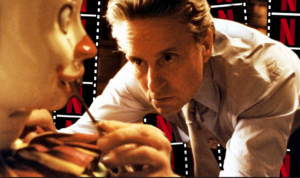
This movie is from 1997 and it is still incredible because we watch Nicholas lose everything. In the beginning, he’s the guy with the private jet that can get into any restaurant without needing a reservation. By the end? He’s literally buried alive and has to claw out of a shallow grave (MESSAGE!).
Once free, he is dirty with no money, no shoes, no nothing. To get home to San Francisco, he must humble himself enough to beg for even the most basic of “luxuries” like food or a ride home. All these “things” he took for granted, he now must humble himself enough to grovel for if that’s what it takes to get answers.
Yes, spoiler alert, but y’all have had since 1997 to see it  . Also, that isn’t the whole story so totally worth a watch and a study.
. Also, that isn’t the whole story so totally worth a watch and a study.
And neither do I.
Until we are tested, we have ZERO idea who we really are. I know that might not be popular to say, but it is true.
I would LOVE to believe that, if aliens invaded, or the zombie apocalypse hit, or whatever, that I would be noble, kind, just and brave. That is being human. We don’t want to think we’d be the one hiding under the bed, running away, or using that obnoxious neighbor as a human shield.
Should have picked up yer dog poo off my lawn, Buddy.
All kidding aside, we tend to have a far rosier view of ourselves than is usually accurate and that is okay. We also, conversely, underestimate what we might be capable of under the right circumstances.
Maybe we will be courageous. Perhaps we will do the right thing even when it will cost us everything. We simply don’t KNOW until those beliefs are tested.

For a great example? Bird Box (movie and book). The character, Douglas, though a hard pill to swallow, makes a lot of great points about this exact topic.
We have no idea what we are capable of doing—good and bad—until tested. Thus, the point of every (good) story is to show this aspect of life in distillate.
Audiences yearn to see that regular people can do extraordinary things or even extraordinary people have to learn lessons we mortals struggle with.
Come on! Even the Norse god THOR battles with pride, ego, arrogance, entitlement and being fickle and shallow. Yes, even the Norse god Thor loves his brother, hurts that his family is estranged, wants love and acceptance, and seeks deeper meaning to his existence.
Darkest Moment in ActionIn my opinion, the darker the darkest moment, the better the story. This is the part where we cannot hold back. When I train writers, I have a saying, “Make it worse until you make it weird.”
We should throw everything including the metaphorical kitchen sink at our characters (the MC in particular). The story is the the fiery forge that is going to remove those character impurities and mold a lump of undisciplined, clueless blech and then allow conflict to hammer that MC into someone magnificent.
What refuses to bend eventually will…with enough heat.

We pile everything onto the MC (and allies) and at the end of Act Two, when the Bright Idea Fairy fails them all, we strip everything away.
The darkest moment is the critical point when the MC finally has a Damascus Road experience. The scales are removed from their eyes and, for the first time, they see the truth about themselves and others and how to be authentically triumphant.
Right after the darkest moment is when our MC finally transitions from a mere protagonist to being worthy of the title HERO.
We Develop in the Darkest Moment
Darkest moments are like dark rooms in photography. Very counterintuitively, we must immerse ourselves in the blackness to reveal the true picture.
I imagine most of us cannot make it too long in life without tragedy visiting. All of you have your stories, which is probably why you’re here. Writing is cheaper than therapy, right?
We love working through our traumas, heartaches, disillusionment by telling stories.
Which is great because humans are a story people!
Whether it is a cozy romance that reminds us love is still alive and romance still possible or an action-packed thriller where bad people get justice not plea deals.
We need catharsis!
Fiction operates in extremes. We love the characters who stand a snowball’s chance in hell (E.g. the Hobbits in LOTR), who have so much to learn that we have NO idea how they’ll survive. But they do. And they WIN.
Yet, we ALSO love the stories involving characters with everything going for them, who finally come up against a problem/foe that demands more than the obvious trappings of power (Dr. Strange, The Game, Stepford Wives, Game of Thrones).
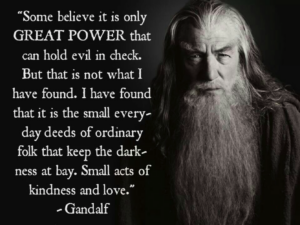
Stories matter. What we write matters. Writers carry the torch of hope and, as long as there are stories, people will have footsteps they can follow from the pages into their own lives.
When We LOSE, We WINFiction shows us that, no matter how bad things get, there is always a chance at a new beginning.
Ultimately, I believe hope springs eternal so long as there are writers in the world. Ideally, now that we’ve taken a deeper dive into what the darkest moment is, what it means and why it is SO important, you’ll look at your stories with fresh eyes.
Maybe people need to remember there is still goodness in the world, that good guys win, justice can happen, the odds are never too great, one is never too old or too young or whatever.
The darkest moments in life—and in story—often mean more than we realize.
The darker the night, the more spectacular the dawn.
What are YOUR Thoughts?I’ve missed y’all! What are some of the most profound darkest moments you can think of in cinema or books? Have you ever had something happen in life SO AWFUL that the only way to make it make any sense was to turn it into story? What are some of your favorite comebacks? Any thoughts on the darkest moment at all? Y’all always have such brilliant perspectives.
I LOVE COMMENTS!
To prove it and show my love, for the month of AUGUST, everyone who leaves a comment, I will put your name in a hat.
I actually have landed agents for people who���ve won this contest. Agents like me because I make their lives easier.
If you comment and link back to my blog on your blog, you get your name in the hat twice. What do you win?
The unvarnished truth from yours truly (and maybe even time with an agent).
I will pick a winner once a month and it will be a critique of the first 20 pages of your novel, or your query letter, or your synopsis (5 pages or less). People with superlative writing, I (with your permission) have been known to pass you onto an agent.
Anyway, I look forward to reading your comments and your writing!
The post Darkest Moment: Why Losing Everything Matters appeared first on Kristen Lamb.



